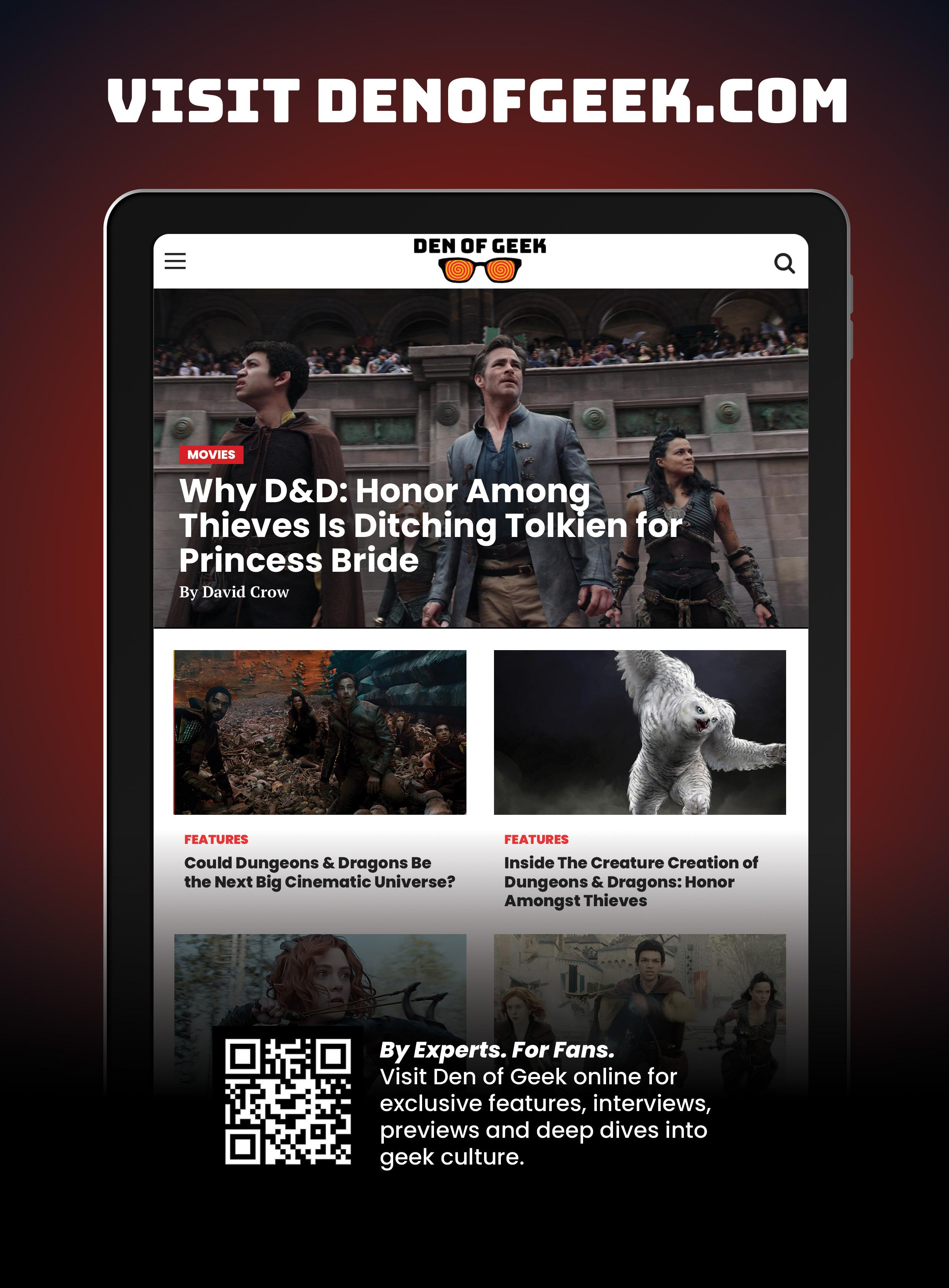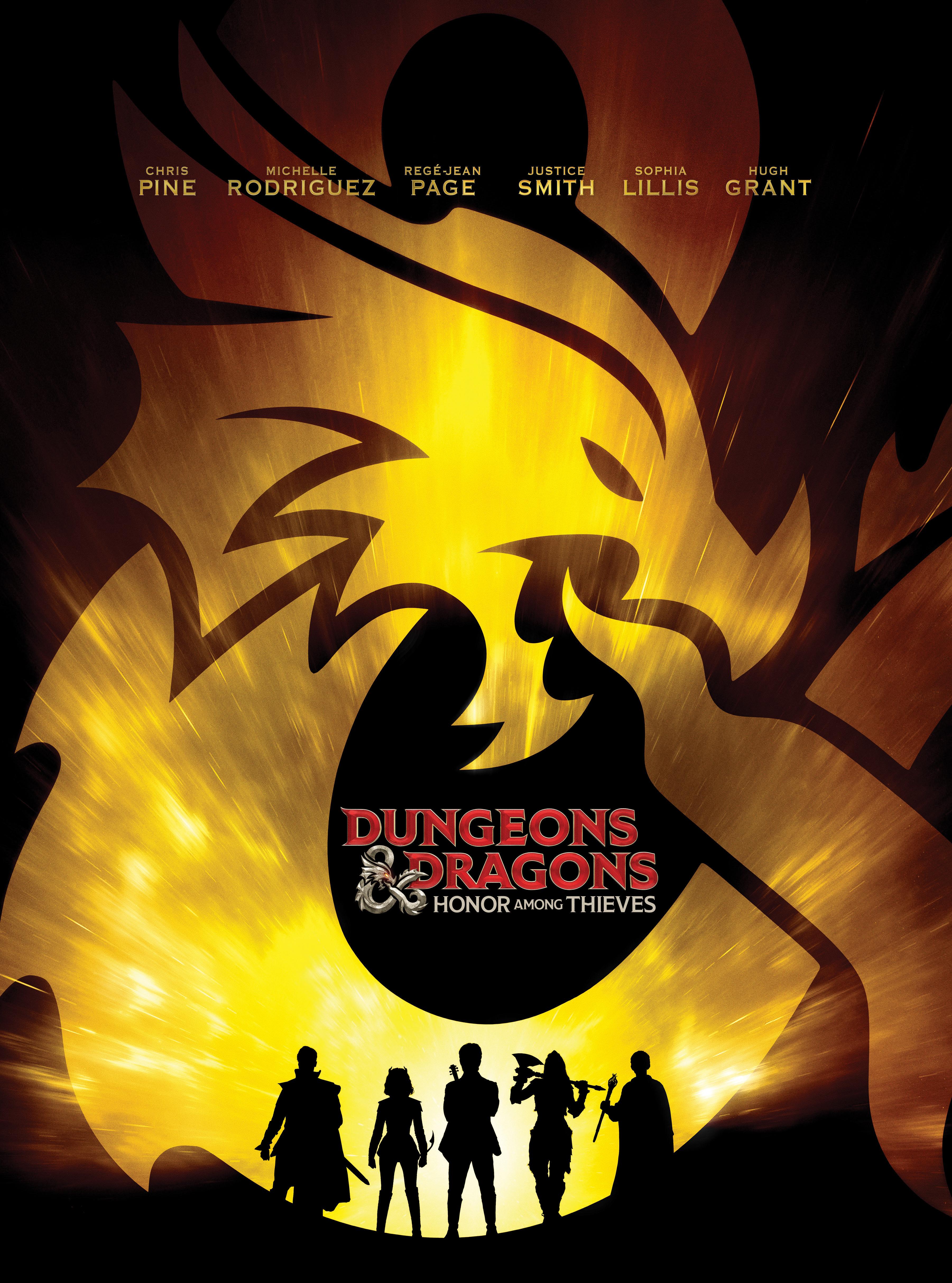






Co-directors and writers
Jonathan Goldstein and John Francis Daley bring you the inside scoop on making this epic adventure movie. PG. 6
Action in the movies takes place in a richly realized fantasy world that combines practical and digital effects. We take you behind the scenes to explore how the film's impressive and fantastical creatures were brought to life and interacted with the cast. PG. 26

Dungeons & Dragons: Honor Among Thieves is an action adventure, featuring a rag-tag band of characters. We investigate how the thrilling combat and stunts came together onscreen with veteran stuntman and second unit director Brad Martin. PG. 32
Meet the star-studded adventure party of Dungeons & Dragons: Honor Among Thieves in our interviews with stars Chris Pine, Michelle Rodriguez, Regé-Jean Page, Justice Smith, Sophia Lillis, Hugh Grant, Daisy Head, and Chloe Coleman! PG. 10



HOW DO YOU BRING a 49-year-old popculture phenomenon to life on the big screen? How do you translate the world’s biggest fantasy role-playing game from an in-person tabletop experience to an in-theater moviegoing experience? And how do you do it in a way that delights existing players while not overwhelming casual moviegoers? These are a few of the questions that we set out to answer over three-years ago when we began our quest to bring Gary Gygax’s venerable Dungeons & Dragons game to cinemas.
The quest to give Dungeons & Dragons the blockbuster movie treatment didn’t start with us. A series of low-budget movies a few decades ago, storied near misses prior to that with young filmmakers like James Cameron and Sam Raimi (whatever happened to those guys!), and countless drafts of screenplays spread across several Hollywood studios in ever-changing rights deals are evidence of the efforts by so many that came before us.
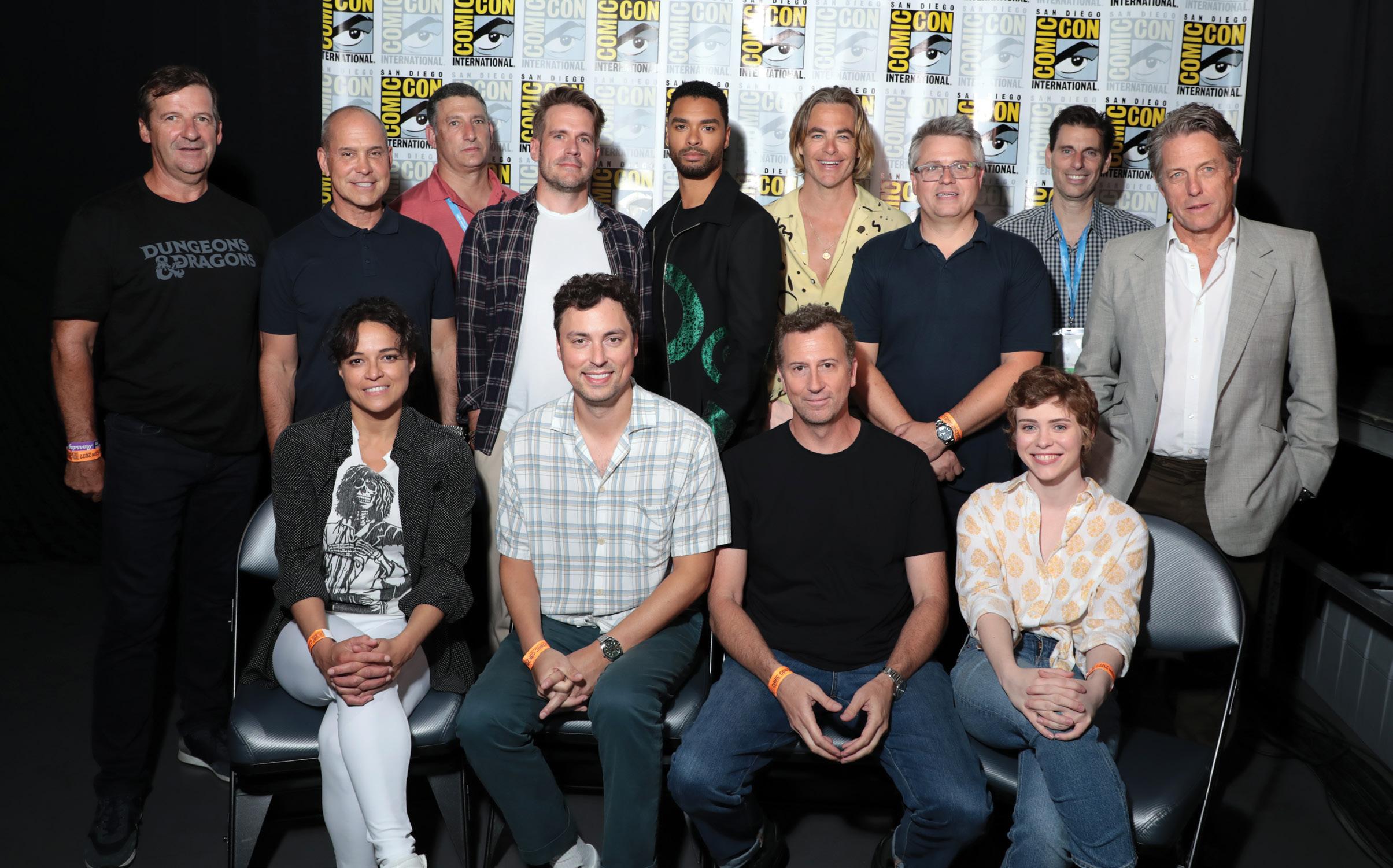
But why? Why was so much time, money and effort expended trying to bring D&D to movie theaters? The answer is simple. Because D&D is the best. The world of Dungeons & Dragons is the most engaging and exciting fantasy world ever created. Because the classes, races, creatures, and settings that make up D&D are worthy of
being realized in stunning widescreen cinematic splendor. Because the mythology and world-building are top-notch. And, most importantly, because the game of Dungeons & Dragons is a heck of a lot of fun.
But just because the game is awesome doesn’t mean the journey was easy. The act of actually getting the game to the big screen was a complicated journey that wound its way through two studios (oftentimes with changing leadership), intense collaboration with incredible brand partners at Hasbro and Wizards of the Coast and a global pandemic. But every step of the way, the journey that our co-writers and directors John Francis Daley and Jonathan Goldstein led us on brought us closer to bringing all of the heart, humor, and spectacle present in a game around the kitchen table with some dice and character sheets to the big screen.
Working hand-in-hand with Michael Ireland, Jon Gonda, and Meg Lewis at Paramount Pictures and Zev Foreman and Ashley Alexander at eOne, we had the fortunate honor of assembling an incredible cast—a handsome bard played by Chris Pine, a lovable barbarian portrayed by Michelle Rodriguez, Hugh Grant at his most charming and roguish, Regé-Jean Page as a quintessentially-stoic paladin, Justice Smith as a half-elf sorcerer, and a tiefling druid portrayed
in all of her (sometimes controversial) owlbear-majesty by Sophia
Lillis.The story being told was a simple one. A group of adventurers, nay thieves, set out to rob only to learn that they have a responsibility to do more and to do right. The story was about lost family and finding new family. And it was ultimately a story about redemption. The script was a blast from the first draft. Everyone who read it was moved by the beauty of the story, the depth of the characters, and the laugh-out-loud humor that arose from the friendships between our thieves turned heroes.
The cast and crew assembled in Northern Ireland in middle of global quarantine and spent months toiling in the dark, cold northern winter to carefully stitch every costume by hand, to painstakingly recreate iconic places like Neverwinter (that had only really ever existed in the imaginations of DMs) on an abandoned backlot, and to carefully design cinematic iterations of fabled monsters such as the gelatinous cube, the epic red dragon Themberchaud, displacer beasts (are there ever less than one or is there only one?), and a majestic aarakocra named Jarnathan. Working closely with the team at Wizards of the Coast led by Nathan Stewart and Jeremy Jarvis, we considered every detail and looked for the perfect way to bring legendary spells like Speak with Dead and Magic Missile to life through the magic of VFX and Practical Effects (special thanks to incredible corpses from the wizzes at Legacy Effects). It was a labor of love that employed hundreds of artists and artisans in Northern Ireland, England, and the USA as well as thousands more at visual effects houses like ILM and MPC.
And the result is a film that we hope captures everything that is so incredible about the game. John and Jonathan’s vision for this movie has been unwavering. And as producers, we have worked hand-in-hand with them to deliver on the vision that we all shared for this film. Will audiences respond? Will a new generation of kids pick up a copy of the legendary Monster Manual and dive in to create their own adventures? Only time will tell. But the quest has been one that made us laugh, made us cry, taught us a thing or two, and delighted us endlessly. We hope to see you at the movies.

Mike Cecchini EDITOR-IN-CHIEF
Rosie Fletcher PRINT EDITOR
Chris Longo DIRECTOR OF EDITORIAL & PARTNERSHIPS
ART
Lucy Quintanilla CREATIVE DIRECTOR
Jessica Koynock ART DIRECTOR | Erin Foster DESIGNER
PRODUCTION
Kyle Christine Darnell PRODUCTION MANAGER
COPY
Richard Jordan SUB EDITOR | Sarah Litt COPY EDITOR
Nick Harley ASSISTANT PRINT EDITOR
ADVERTISING
Matthew Sullivan-Pond PUBLISHER

Colby Olson ADVERTISING ACCOUNT MANAGER
Vanessa Chouest ADVERTISING ACCOUNT EXECUTIVE
DENOFGEEK.COM
Mike Cecchini EDITOR-IN-CHIEF
John Saavedra MANAGING EDITOR
Rosie Fletcher UK EDITOR
EDITORIAL
Alec Bojalad TV EDITOR | Matthew Byrd GAMES EDITOR
David Crow SENIOR FILM EDITOR
Kirsten Howard NEWS AND FEATURES EDITOR
Louisa Mellor UK TV EDITOR
ART

Lucy Quintanilla CREATIVE DIRECTOR
Jessica Koynock ART DIRECTOR
Chloe Lewis JUNIOR DESIGNER
AUDIENCE DEV & SOCIAL MEDIA
Elizabeth Donoghue
HEAD OF AUDIENCE DEVELOPMENT
Maznah Shehzad AUDIENCE DEVELOPMENT STRATEGIST
Lee Parham SOCIAL MEDIA COORDINATOR
And a very heartfelt and special thank you to our fellow Producer and former Hasbro CEO Brian Goldner, who didn’t get to see this film brought to life but without whom this film never would have existed.
PHOTO & VIDEO PRODUCTION
Nick Morgulis SENIOR VIDEO PRODUCER
Andrew Halley HEAD OF VIDEO PRODUCTION
DEN OF GEEK IS A TRADEMARK OWNED BY DEN OF GEEK WORLD LIMITED, A COMPANY INCORPORATED AND REGISTERED IN THE UNITED KINGDOM WHOSE REGISTERED OFFICE IS AT THE BROADGATE TOWER, 20 PRIMROSE STREET, LONDON EC2A 2RS. DEN OF GEEK US INCORPORATION DETAILS: DOGTECH LLC, 601 HERITAGE DRIVE, SUITE 484, JUPITER, FL 33458, PHONE: +1 561-656-2377,

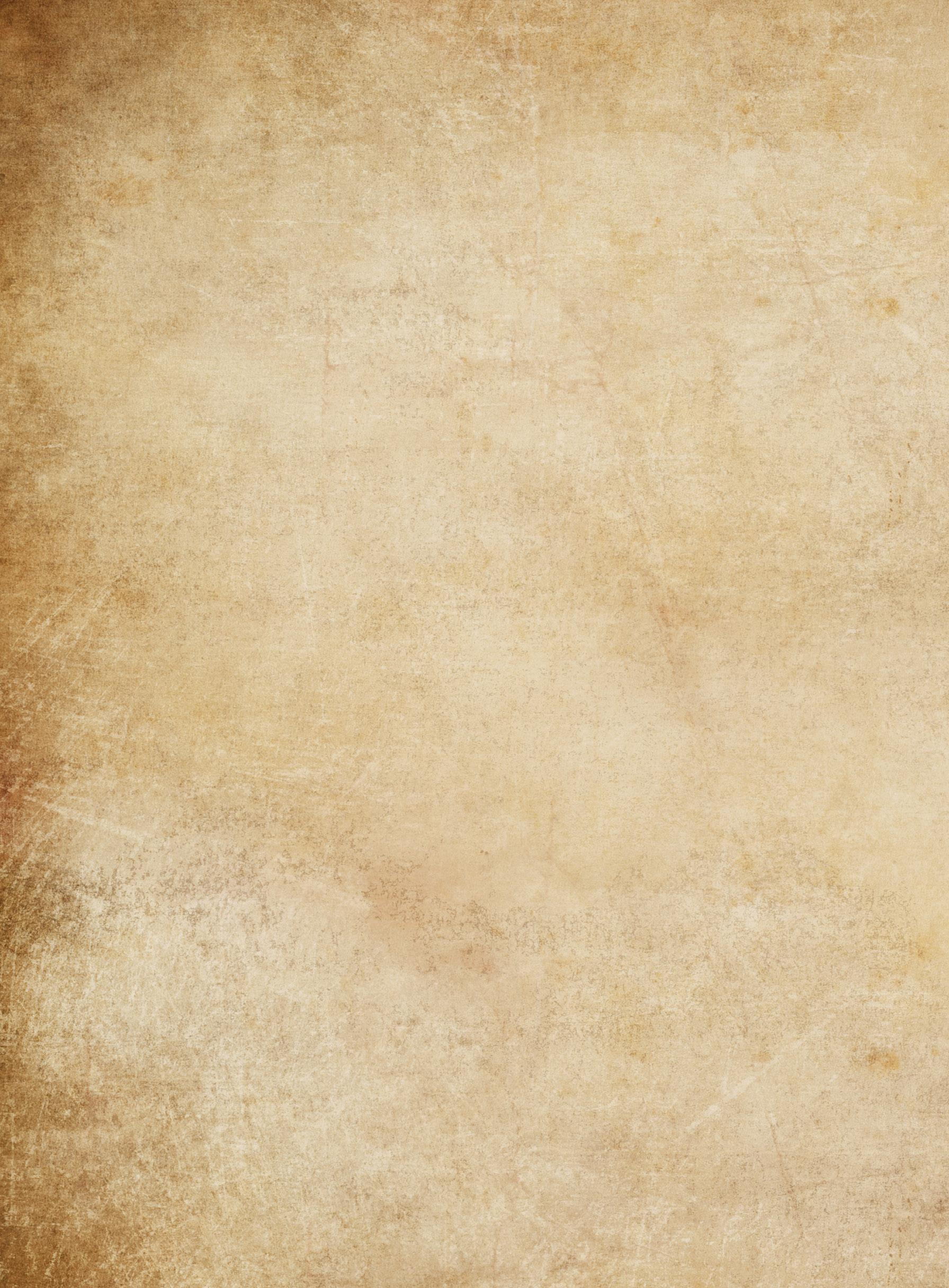 L-R: Michelle Rodriguez as Holga, Justice Smith as Simon, and Chris Pine as Edgin.
L-R: Michelle Rodriguez as Holga, Justice Smith as Simon, and Chris Pine as Edgin.
THE FIRST STEP OF ANY DUNGEONS & Dragons campaign is to pick your character class. The character class decides your aptitudes and your play style and is often a big clue as to what you want to get out of the game.
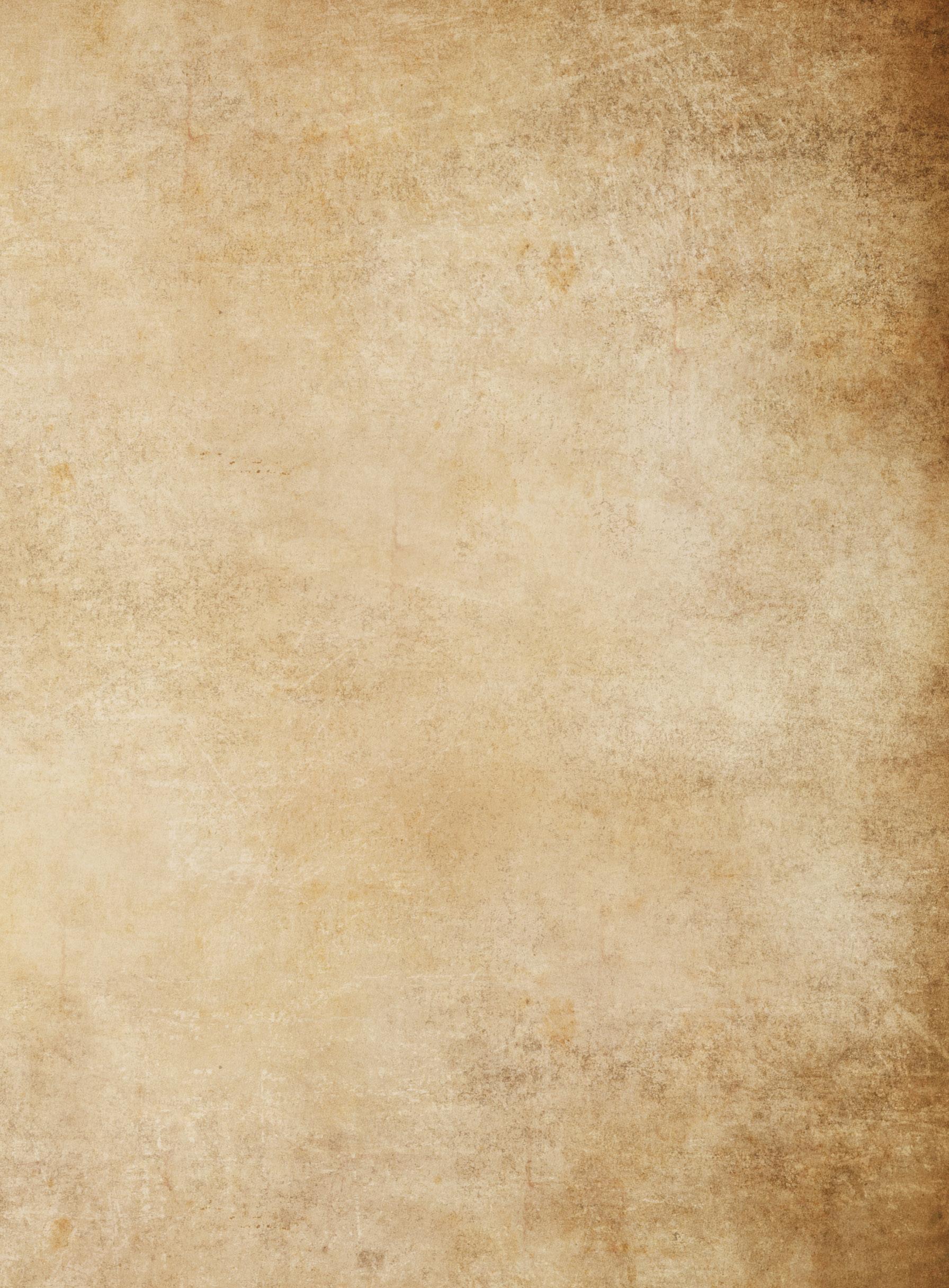
“I’m usually a paladin,” says John Francis Daley, one of the writers and directors of Dungeons & Dragons: Honor Among Thieves. “The paladins have an unusually stacked list of advantages, and I like to take advantage of all of them.”
His co-director and writer, Jonathan Goldstein, hasn’t played Dungeons & Dragons since he was a kid; however, he doesn’t hesitate before answering, “If I did play now, I’d be a bard. I don’t like to fight.”
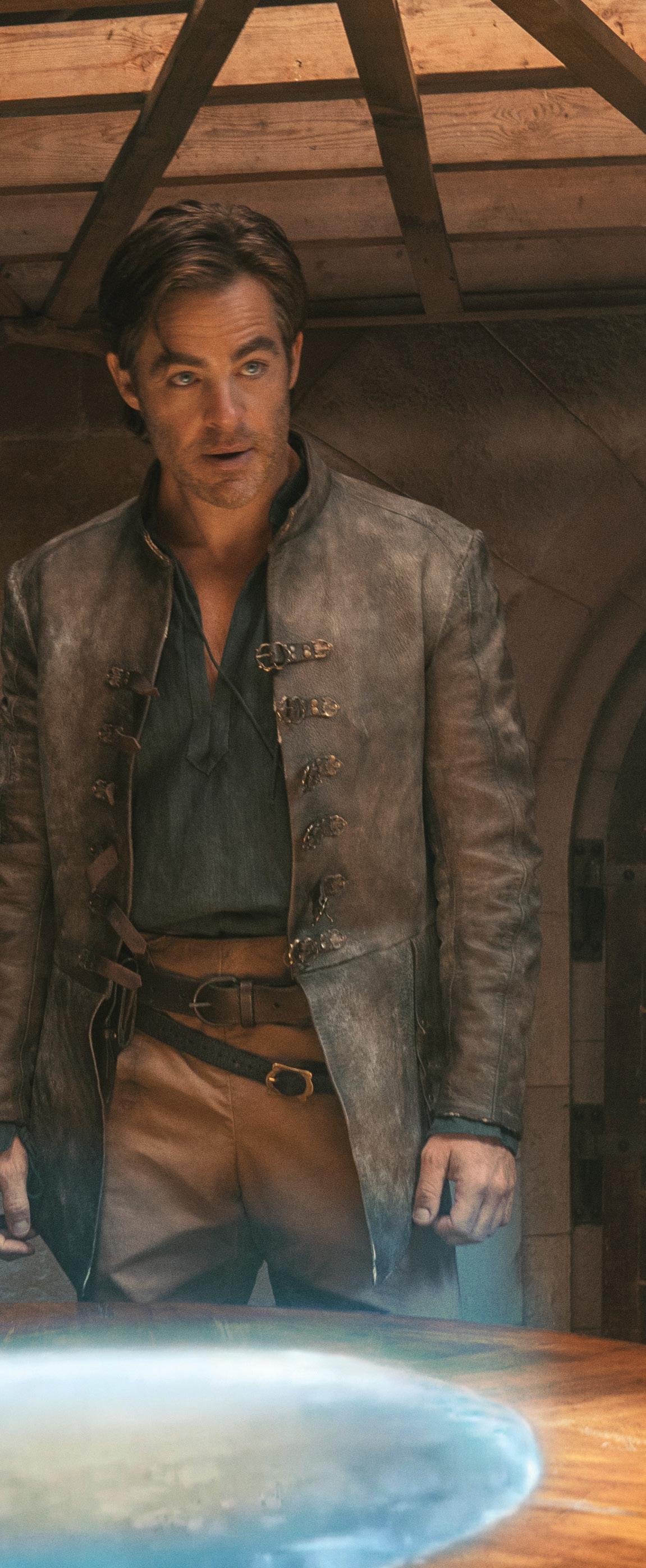
In real life, however, Goldstein and Daley are multiclassing as writers and directors, with the screenplay to Spider-Man: Homecoming behind them, as well as the comedies Game Night and Vacation. While the pair have not gone far into the action/adventure genre yet, talking to them, it is clear how much they love it.
“We talk about our influences ranging from The Princess Bride and Monty Python and the Holy Grail on the broader side of things, to The Lord of the Rings,” Goldstein tells us. “We’re kind of straddling the two worlds. Ours is a movie that doesn’t take itself with great seriousness, but it’s never a spoof. It honors the world of D&D and celebrates it, but hopefully, it gives the audience an engaging and fun ride.”
That ride could not have come at a better time. With series like The Lord of the Rings: The Rings of Power, House of the Dragon, and Disney+’s new Willow revival lighting up our screens at home, and Warner Brothers just announcing a new series of movies set in Middle-earth, audiences haven’t been this ready for some old-fashioned, big-screen
At the same time, Netflix’s continuing juggernaut, Stranger Things, has introduced a whole new generation to the Dungeons & Dragons hobby, with words like Demogorgon, Mindflayer, and Vecna penetrating the public consciousness in a way that they never had as entries in Dungeons & Dragons bestiaries and rulebooks.
But while the fantasy genre is undergoing an on-screen renaissance, and interest in role-playing games in general and Dungeons & Dragons, in particular, has never been higher, no movie has yet been able to capture the unique kind of chaos found in stories created at the game table. Dungeons & Dragons: Honor Among Thieves aims to do just that.
“The thing that is so unique to D&D is the spirit of gameplay. There is this level of unpredictability and subverting a narrative where you think you’re gonna go down one road, and suddenly one roll of the die takes you down a road that not even the Dungeon Master anticipates,” Daley explains. “That was something that we found very interesting and different from the types of fantasy films we’ve seen in the past.”

The influences that fuel Dungeons & Dragons: Honor Among Thieves are not all swords and sorcery, however. Daley takes another direction entirely.
“For me, Indiana Jones is quintessentially Dungeons &

Dragons,” he says. “It literally starts with the dungeon crawl. Granted, he’s not in an ensemble, he’s a solo player, which might not be the most fun campaign in real life. But, boy, every set piece feels like a well-curated campaign by a dungeon master.”
That Indiana Jones format—go into the maze, solve the puzzles, dodge the traps, and grab the treasure, is not just evocative of Dungeons & Dragons but another genre entirely: the heist movie. And ultimately, the heist genre became the foundation for the film Goldstein and Daley decided to make.
“We wanted to create a film that would be entertaining and appealing to all audiences, whether you knew D&D or not,” Goldstein says. “For that to work, we needed a sort of scaffolding and infrastructure for the movie that would be enjoyable and engaging. We’ve always wanted to do a heist movie.”
The structure of a heist seemed like a fun opportunity to take the audience through the world of D&D in a way they had not seen before, given it is a sub-genre not normally explored by fantasy films.
“It is a genre that people are familiar with and can kind of serve as a gateway to the uninitiated,” Daley says. “They understand what our characters are setting out to do without being overwhelmed by lore or proper nouns that might confuse them.”
While providing a way in for new audiences, the heist framework also allowed the directors to introduce the kinds of challenges that are the bread and butter of your typical Dungeons & Dragons game.
“Because it’s a heist picture, we would often write ourselves into a predicament that our characters have to face,” Daley says. “Whether it be how do we sneak this picture frame that has a portal on it into a carriage? Or how do we cross this elaborately booby-trapped bridge? We needed to figure out the best possible way to get across which is so evocative of gameplay. You’re talking to each other, communicating, and figuring out the best possible plan of attack.”
That freedom and creativity offered by Dungeons & Dragons were formative for the nascent director in a young Goldstein.
“I just loved the idea of a game that you essentially made up yourself,” he recalls. “The freedom of that was intoxicating. It was eye-opening.”

Daley, meanwhile, is still a passionate player of the game today. As Goldstein points out, “Ironically, the movie took him away from playing!”
Daley says, “A couple of years before the pandemic, I got back into a campaign with my group of friends and was immediately reminded of the reason why I loved it so much. I was playing, basically, up until we left to shoot the movie.”
Although Daley and Goldstein were doing a lot to subvert the fantasy genre, there were also elements of old fantasy films they were keen to bring into Honor Among Thieves. Particularly the special effects.
“One of the biggest selling points we had for joining this project when we were pitching our take to the studio was that we really wanted to lean into practical effects,” Daley tells us. “Not taking anything away from the visual effects, which there are a substantial amount of in this film, but for us, we think this is such a fun throwback to the adventure and fantasy films from our youth in the ’80s and ’90s. That reliance on practical effects where you didn’t have the benefit of CGI.”
Daley and Goldstein sought to find a perfect hybrid, a fusion of the two different approaches that felt tangible and real and just all-around visually fun.
“I think the audience can feel the difference,” Goldstein says of their approach.
Each of the directors has their own favorite practical effect. Goldstein’s is a baby tabaxi (a kind of cat person).
“The thing is just incredible,” he says. “It looks so real.”
Daley’s favorite is much less cute—the dragonborn, who, like the name suggests, look like humanoid dragons. Unsurprisingly, the realistic movements of the dragonborn in Honor Among Thieves are achieved through motion capture. More surprisingly, those motion-captured movements are applied to animatronics.
That“All of our dragonborn were practical,” Daley explains. “They utilize state-of-the-art motion capture technology, where they had cameras trained on the puppeteer who would say the lines and make facial expressions, and those movements translated to the servo motors in the face of the dragonborn. It even got the lip sync down. Nowadays, with some of these practical effects, especially with the best versions, they utilize computer technology just like the CGI effects do.”
Ultimately, Honor Among Thieves is a story about characters, and the adventuring party at the center of the film is its most important element.
For Goldstein, it came down to the age-old adage among D&D players—“You never split up the party.”
“That spirit of collaboration is integral to playing D&D,” Goldstein says. “We designed a group that would need one another to succeed because none of them by themselves is great. And together, they become this unlikely family and find their strengths in the group.”
spirit of collaboration is integral to playing D&D
The characters they created weren’t defined by their superpowers or special abilities but by their various flaws and vulnerabilities.
“The impairments help to establish a character that has room for growth,” Daley says. “What gave us a lot of freedom to create fleshed-out backstories for each of our characters was the fact that they have a lot of flaws that they have to work through.”

This was even visible in the magic spells characters were allowed to use; as Goldstein points out, “There’s a tendency to think that magic can solve all problems, and we have our sorcerer address that directly in the film. Because it makes storytelling nearly impossible if you can solve any problem with a magical spell.”

But while each of the “heroes” (if you can call them that) in Honor Among Thieves has their own flaws and limitations, when they come together, they truly shine.
“It was important to us to find a diverse group, in terms of their personality types, their skill sets, what makes each of them appealing in their own unique way, which is obviously crucial to a good adventuring party in a campaign, but also crucial to a film ensemble,” Daley tells us. “You don’t want people that are similar; they all have to bring their host of bizarre personalities. And that to us was crucial.”
Having written the characters, the next step was to assemble the cast to play them. But for a Dungeons & Dragons movie, “playing” had a slightly different meaning…

“When the actors arrived in Belfast, we played a severalhours-long game of D&D with them,” Goldstein says. “And that gave those who were not familiar with it a quick taste of what the game is like and how you interact, and they played as their characters.”
It not only helped the cast bond and introduced them to the
 Edgin (Chris Pine) and Xenk (Regé-Jean Page) with a curious artifact.
Hugh Grant, directors John Francis Daley and Jonathan Goldstein, Michelle Rodriguez, Chris Pine, and crew on set of Dungeons & Dragons: Honor Among Thieves.
Edgin (Chris Pine) and Xenk (Regé-Jean Page) with a curious artifact.
Hugh Grant, directors John Francis Daley and Jonathan Goldstein, Michelle Rodriguez, Chris Pine, and crew on set of Dungeons & Dragons: Honor Among Thieves.
world but also informed the directors’ takes on the characters.
“It was informative, both to them and to us, because I think we incorporated some of the things we learned from that game into the film,” Goldstein says.
During their pre-shoot D&D game, the directors learned quite a bit about their cast.

“I would say that every time Justice Smith had to perform an action, it was Animal Friendship. A lot,” Daley recalls, referring to a spell that lets you convince a beast that you mean it no harm. “He relied on Animal Friendship at every turn, even in the least appropriate times.”
Goldstein adds, “He’d be falling off a cliff with no animals around, and he would still try Animal Friendship.”
Other players showed a far more in-depth grasp of the rules of the game. For instance, Regé-Jean Page, who plays the paladin, Xenk.

“We got a first glimpse at his true geekdom because he very much knew the mechanics of the game,” Daley says. “I think he spent a lot of time playing role-playing games, and despite his being incredibly handsome and talented and an athletic fighter, he’s also one of the biggest nerds I’ve ever met.”
While the game was informative, it was also fun and set the tone for the kind of experience Goldstein and Daley wanted to create with Honor Among Thieves.


“I want audiences to feel better leaving the theater than they felt coming in,” Daley says. “I have my own personal experiences with some of the movies that shaped me and made me want to become a filmmaker. That feeling was something that drove me throughout this process, to get other people to feel that way as well. That, to me, is the most gratifying thing a filmmaker could ask for.”
So is this the end of their quest? Or do further adventures await? Neither of the directors will be drawn on the question of a potential sequel. It is clear they are excited for people to see the world they have created, but when it comes to talk of a broader franchise, they take their cues from producer Jeremy Latcham, who was previously the producer on the mega franchise-founding Iron Man movie, as well as several of the Marvel Cinematic Universe’s high points since.
“We’d be excited to dive back into this world, but our producer Jeremy Latcham likes to remind us of his approach in the early days of Marvel—make one good movie,” Goldstein says. “Don’t think about universe building. Don’t think about franchises. Just put everything into the one movie you’re making. Then if it works, you do more. That’s how we approached it.”
Daley agrees, adding, “The thing that we are most excited about now is not even the potential for a sequel, but just finally being able to present this film that has been a labor of love and a lot of hard work on not only our part but on the part of the hundreds and hundreds of technicians and filmmakers that worked alongside us to be able to bring that out to the world.”
Director Jonathan Goldstein works with Chris Pine on set of Dungeons & Dragons: Honor Among Thieves.Get to know the actors behind the unlikely bunch of adventurers who set out on an epic quest in Dungeons & Dragons: Honor Among Thieves.

 Left to right: Justice Smith as Simon, Regé-Jean Page as Xenk, Chris Pine as Edgin, Michelle Rodriguez as Holga, Sophia Lillis as Doric, and Hugh Grant as Forge.
Left to right: Justice Smith as Simon, Regé-Jean Page as Xenk, Chris Pine as Edgin, Michelle Rodriguez as Holga, Sophia Lillis as Doric, and Hugh Grant as Forge.
How would you describe the character Edgin?
CHRIS PINE: He’s a bard/planner. He doesn’t have special traits other than incredible charm, and he sings to get people to want to party and save the world. He’s like a great emcee; I don’t know if he organized the party so well, but once everybody’s there, he makes sure everybody has a good time, even when the world's falling apart.

What kind of heroes are these thieves?
These are classic, not reluctant heroes, but not the gang you expect to save the day. They are the Bad News Bears
of world-saving. They have powers, but some are working on getting better at them. It’s a gang of misfits.
What compels a guy like Edgin to save the world?
The guys and gals are thieves, but they’re doing it for personal reasons that go above and beyond just stealing stuff. The reason Edgin is leading this thing is a personal need.
Had you played the tabletop game before taking this role?
It just so happens that the day I got the script and was offered it, my nephew was coming over to play
D&D with his friends at my house. I read the script, then got a chance to see what this game was all about and how much joy and creativity it created. I didn’t play the game that time; I played later on with my entire family and played a bard.
How does Edgin fit with your other characters?
It fits in nicely with the kind of characters I like to play: normal dudes that task themselves with doing big things, even though they may not be good at it, or don’t have special powers or don’t believe in themselves that much.
Q:What can you tell us about Holga the barbarian?
MICHELLE RODRIGUEZ: She’s a woman of few words and a big temper. I’ve made an entire career of temper tantrums. It’s cool that I get to play this really awesome barbarian who’s very matter-of-fact about everything.
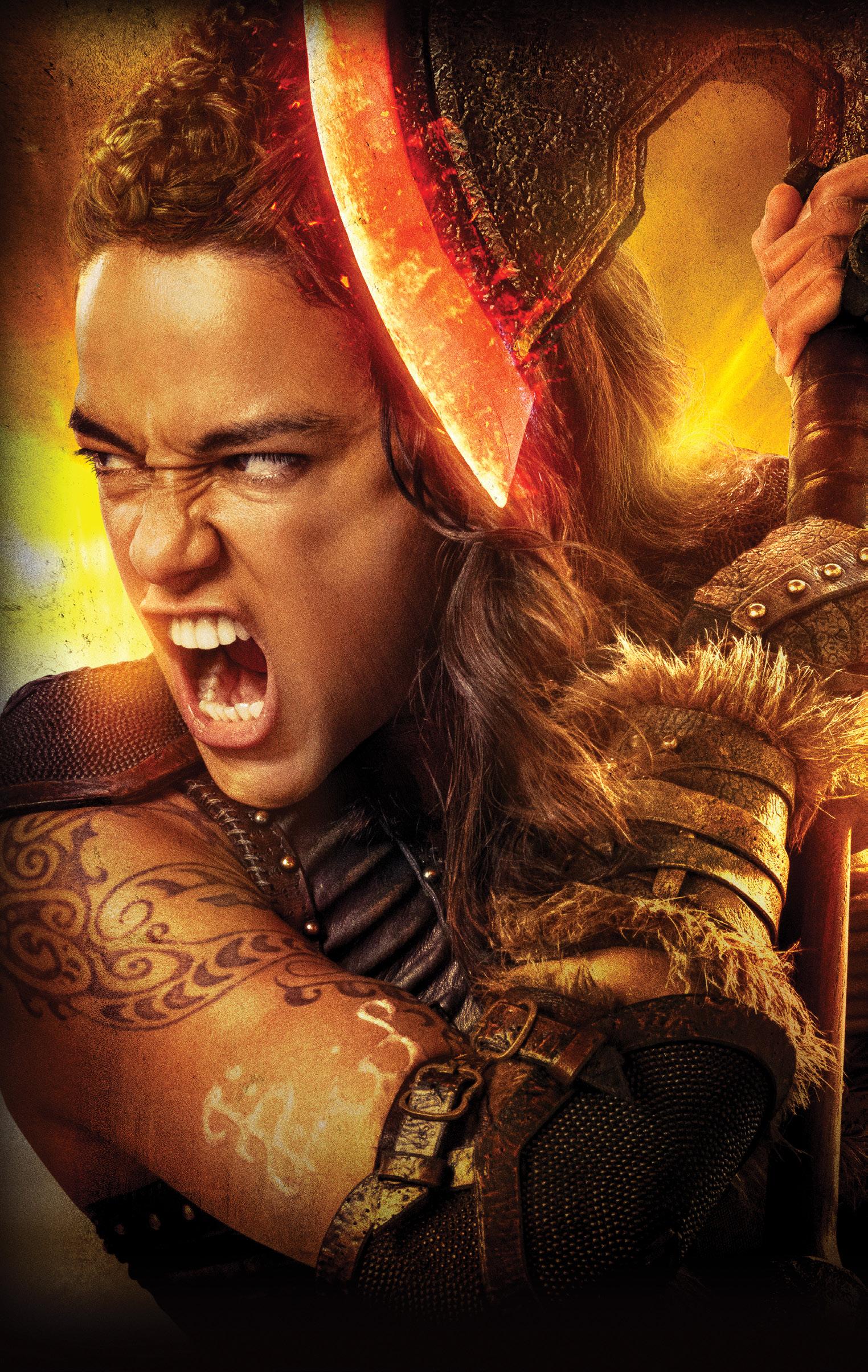
In tabletop D&D, barbarians have the rage class feature—did you play into that?
Absolutely. I think people will be satisfied with her battle rage.
You are doing some fantastic fight choreography. Do you have a background in martial arts?
Absolutely not, but the 15 pounds of muscle I gained for the role beg to differ. It was really more about trying to develop a great scene because sometimes you can get lost with punches and kicks. My main concern in almost every action movie I do is to try to gain some flight in there and to accentuate the fight so that it doesn’t look like everything else we see.
What was your conditioning like? [My trainer] overfed me with protein and pumped me up with weights. I was pretty hardcore. I had to ask them for a punching bag because Holga really got to me!
Despite filming in lockdown, you got to do some great location work. There were so many great places that we visited not only in Northern Ireland but also in England. The old cathedral that we shot in was my favorite. It’s massively beautiful, the architecture—it’s pretty extraordinary just to be walking through it. We weren’t staring at a blue screen, and that really made a difference for me in the performance.
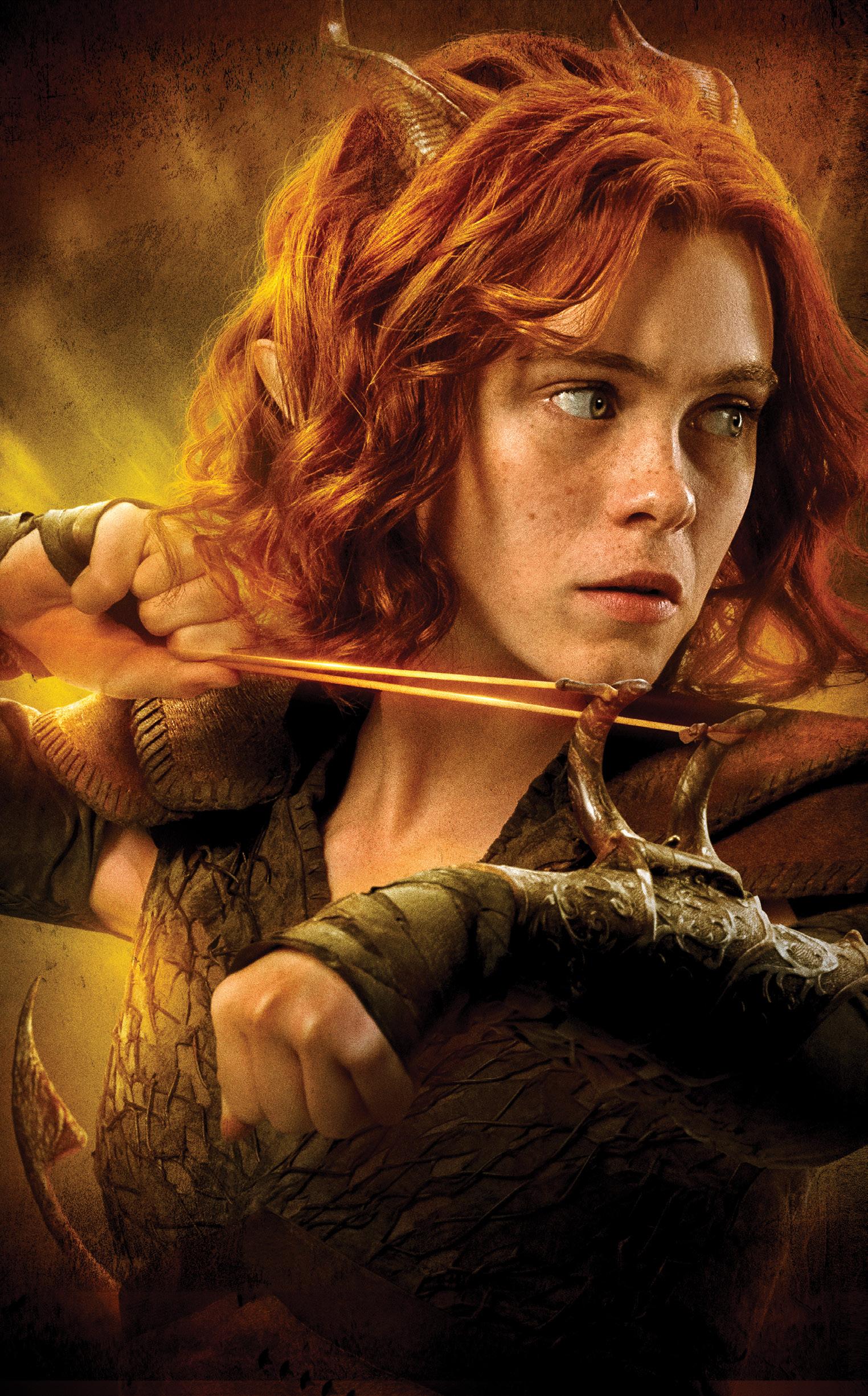 † BY ALANA JOLI ABBOTT
† BY ALANA JOLI ABBOTT
Q:You play Doric, a tiefling druid. What can you tell us about her?
SOPHIA LILLIS: Out of the group, she’s kind of a straight man. Everyone else is a thief or an outlaw. She’s more lawful good. She’s the one keeping everything together instead of going out of control and spiraling and failing. She helps things move along if things get too crazy. It was actually a relief for me because all of the comedy aspects were left to the experts like Chris Pine, Regé-Jean Page, and Hugh Grant. My humor was very deadpan.
How did the party wrangle her in if she does not want to be involved with the chaos?
They had similar objectives. In order for her to do what she wants, she felt, “I suppose it’s necessary for me to help you guys on your journey because I want you to succeed and it doesn’t seem like you would without me.”
What kind of makeup process did you have to go through?
It did make my day start a little bit earlier. I wore a wig; underneath it was this contraption that went around my head that had two magnets toward the end. [There were] two holes in the wig that they’d plop little magnetic horns right on top. For the ears, it was just simple prosthetics. The only problem is, when I do stunt work, the horns do plop right off.
Doric turns into an owlbear—what was your part of that FX work?
Basically, I crouched down, I turned into an animal, and I was done for the day. I was happy with how it turned out. There was always that [question] in my mind: how would [the effects crew] do that realistically? Would my face elongate into something? They did a very, very, very good job.
Q:You play Simon, the party caster, a half-elf sorcerer. What can you tell us about him?
JUSTICE SMITH: Simon doesn’t really have a lot of control over what he can cast. Sorcerers are born with magic in their blood and run on intuition. Wizards are scholars, and they learn magic. Simon’s a descendant of wizarding blood, the scholarly line, and he is an incredibly powerful sorcerer. The only thing that really gets in his way is his lack of self-confidence. So he goes out on this journey to learn how to be better at that.
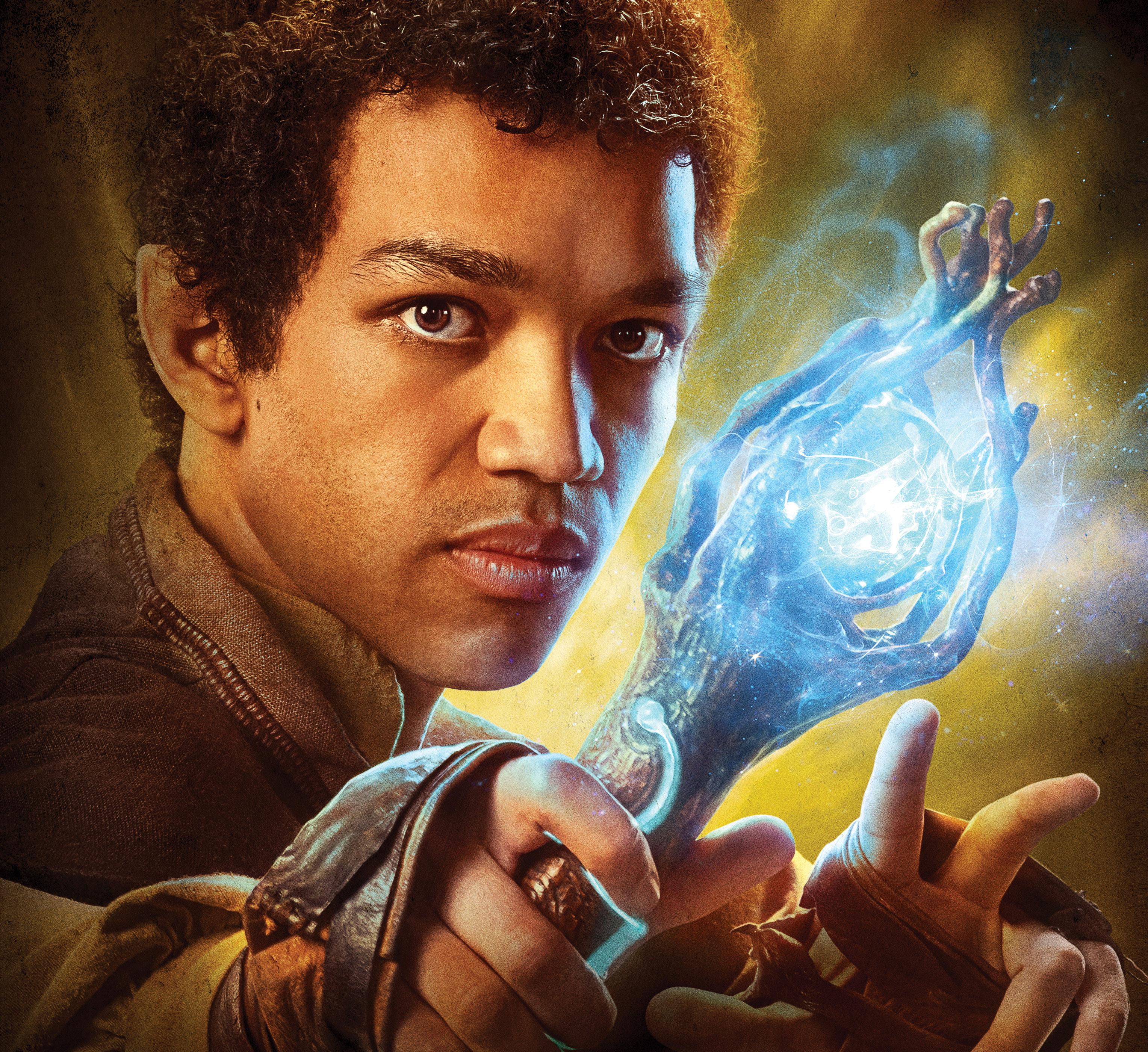
Gamers know that we keep our casters in the back because they’re the characters that are
most likely to get injured in combat. Did you end up having that kind of role?
We kept it in line with the game. Any time Simon is on the offensive, it’s always through his magic from a distance. But I did get to do a lot of stunt work. Not really fighting, but a lot of falling, I’ll say. So that was fun.
What can you tell us about your magic?
It’s really cool when you do a spell on another person, and that person just has to act like it’s affecting them. It feels like when you’re in school and you’re playing pretend on the playground. You make up rules, like “I have a forcefield, and your spell bounces off!” It was exactly like that:
“I use a spell that froze you in place. You can’t move.”
Were you a gamer before the film?
I’m a huge gamer. I love video games specifically, but I also love board games. I do a lot of escape rooms. We played [D&D] once with the cast and the directors before we did the film. We did a campaign that was what would happen after the sequence of events in the film. So we improvised as our characters and created a story. It was like research because we got to delve into our character’s psychology more. D&D is very similar to acting, where you create your own character and create your own backstory based on a script. You feel them out, and you learn things about them along the way.
Q:You play Xenk, a paladin who is a bit of a stick in the mud. What can you tell us about your character?
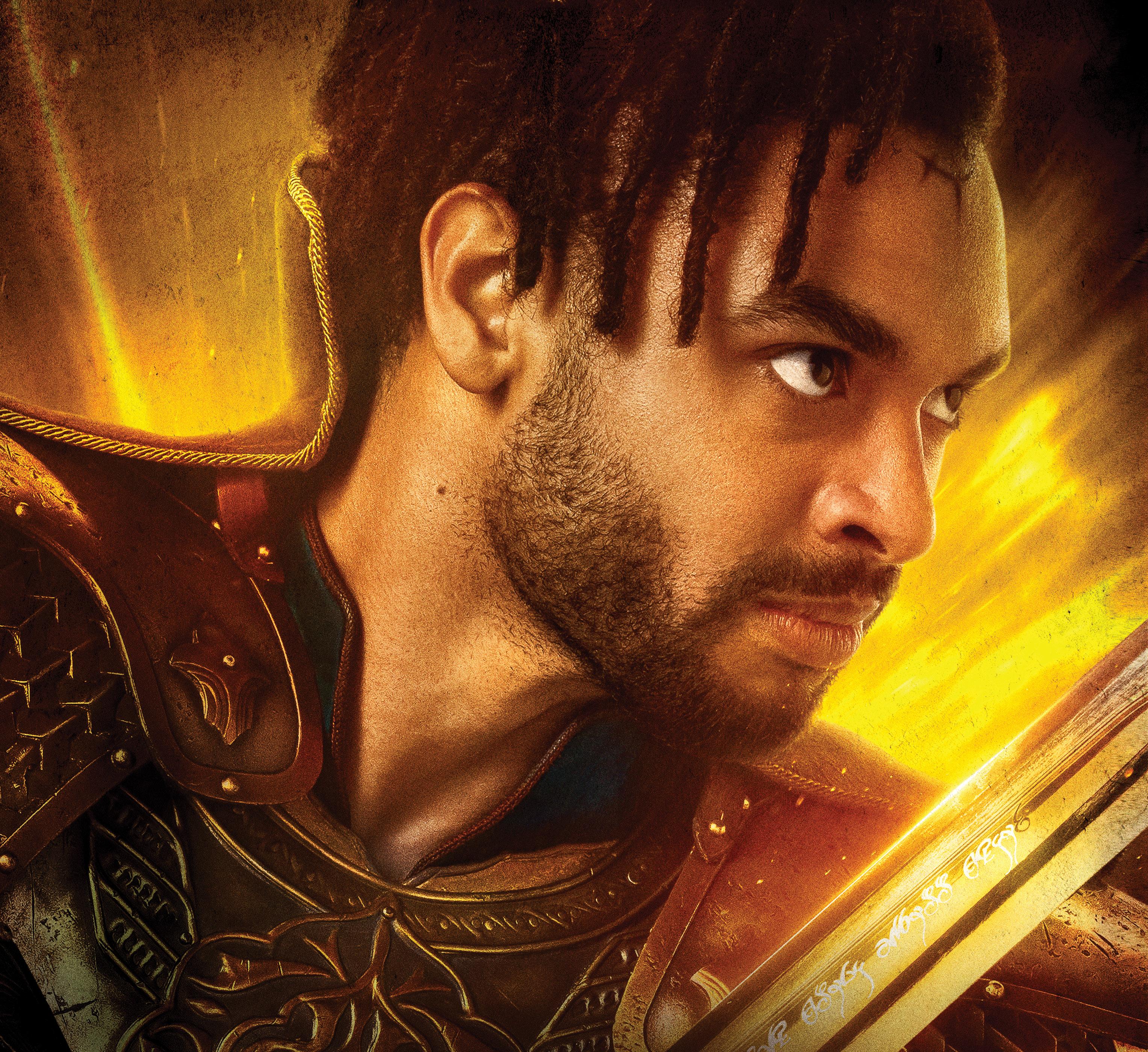
REGÉ-JEAN PAGE: I don’t think he’d describe himself as a stick in the mud. I think his action sequences would also beg to differ. He’s not necessarily no fun. He’s just very effective and lawful good, which is often mistaken for lawful boring. The joy of every character in this movie is realizing their own absurdity very slowly while also holding on to their heart. That’s the tightrope that I think we’ve walked very well. The movie is really fun and funny but it has so much heart.
You said lawful boring, which means that you are familiar with
how much grief paladins get at Dungeons & Dragons tables. I’m more D&D adjacent. I grew up playing a lot of JRPGs. I spent far too many hours of my teen years playing Diablo, in which I usually played paladins. Clearly, I was drawn to this.
You mentioned your fights—what kind of training did you do?
Infinite training. I did a lot of straightup conditioning because you have to be in much better shape than you think to get through hours and hours of stunt choreography, particularly in a full suit of armor and a cape. We broke the first law of Edna Mode—I am absolutely wearing a cape, and it’s fabulous. It doesn't make the fighting easier, but it does make it fancier.
What’s your favorite part of your costume?
The sword occupies that gray area between wardrobe and props, but it’s very much a part of the look. Xenk would say it’s very much part of him.
If you were surrounded by goblins, which character would you most want to have your back?
If I feel that I’m in any kind of danger, then it’s a fairly easy pick for Holga —Michelle Rodriguez’s character— because she has the most incredible fight sequences and she is just unstoppable. For pure entertainment value, if nothing else, being able to have the privilege of sitting back and watching Holga dispatch with goblins, I could think of nothing better.
Q:Dungeons & Dragons has a long cultural history and a strong fantasy aesthetic. What did you most enjoy about working in the D&D world?
HUGH GRANT: I’m slightly frightened of fantasy worlds, if truth be told. I can’t really cope with this one we live in, let alone new ones. I wanted to do this film more because the script and writer/directors made me laugh.

Based on the trailer, you’re playing a wealthy villain. What’s the most fun part of being the known villain of the piece?
I would not call myself a villain. I would call myself misunderstood.
In a big fantasy film like this, there’s a lot of interaction with sets and pieces that will be added to the film in post-production. What’s the hardest part of working with special effects like that?
I was particularly terrified of one of the red wizards. She looked like my old art teacher, Mr. Pye. He was mad and used to paint us blue.
Were you familiar with D&D before being cast in the film? Are you a gamer yourself?
I’m afraid I’m not a gamer myself. Unless you include tennis.
The game is known for its improv at the table. How much improv were you, as actors, encouraged to do within the script. Are there moments we should be watching out for?
I think I bunged a few things in. It’s hard to stop me. But on the whole, the script didn’t need enhancements. [Michael Gilio, John Francis Daley, and Jonathan Goldstein] are very good writers.
Q:Your character is a bit of a mystery. What can you tell us about her?
CHLOE COLEMAN: My character, Kira, is the daughter of Edgin, who is the bard [played by Chris Pine]. Without giving anything away, I can tell you that family is very important to Edgin. Kira and the whole team have incredible uphill battles to fight the entire time. But Kira really holds her own. She’s very strong, and she’s a very important piece of the puzzle.
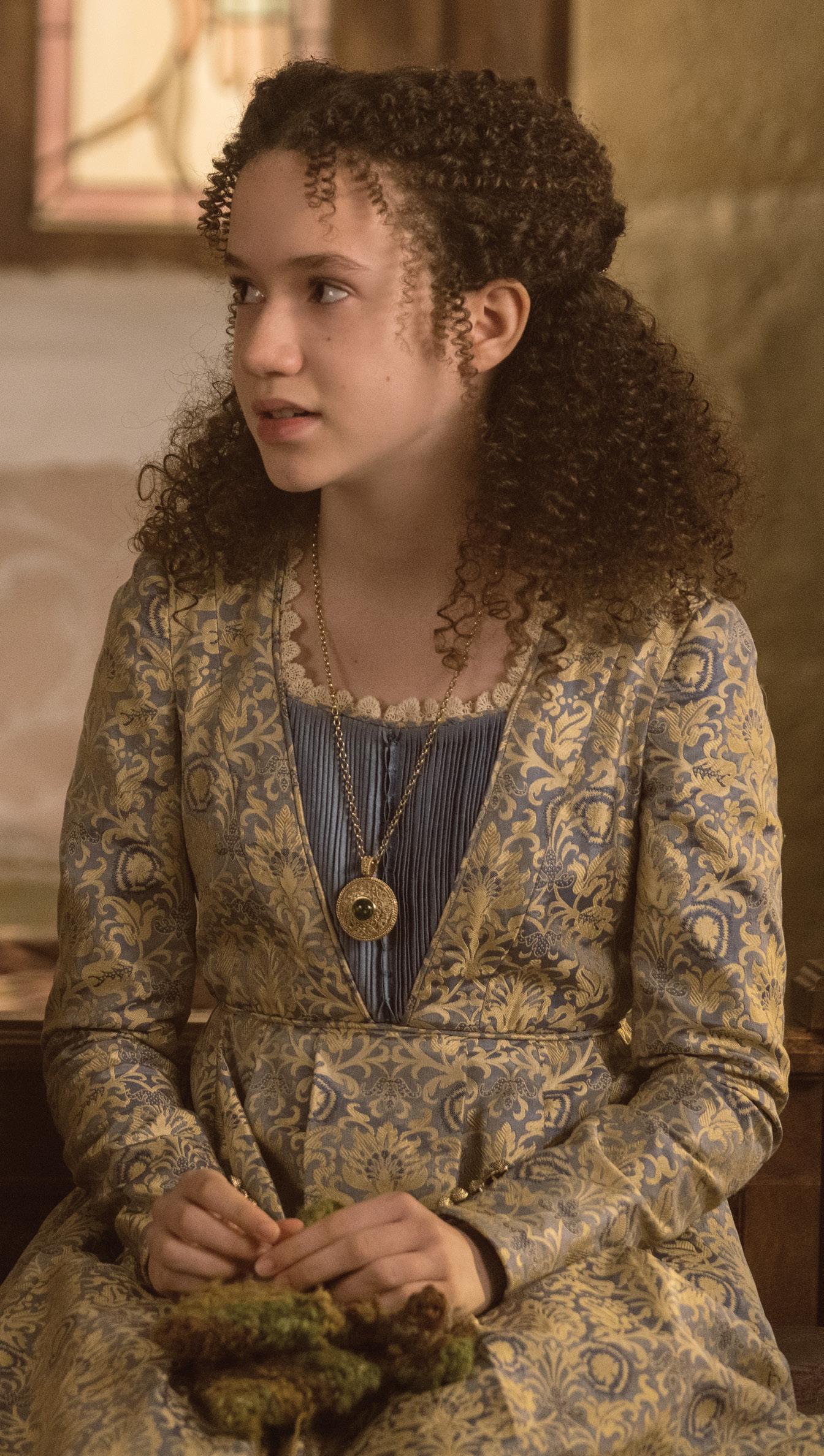
What are the challenges of working on a film that has so many special effects?
One of the things that’s so beautiful about the movie is how many practical sets we ended up building in Northern Ireland. We shot at Titanic Studios, where they shot most of Game of Thrones. The first time that I saw these amazing layouts, my jaw dropped. You feel completely enveloped in this stunning environment. Even though there are a ton of special effects, we had so much real set to work with.
Have you played D&D?
When I booked this role, I played with director Jonathan Goldstein’s son and my sister, and we had a dungeon master who was a real pro. We played about once a week. Playing roleplaying games is so different from any other type of gaming. It's limitless.
If you had to be stuck on a road trip with one character from the film, who would you choose?
CC: I would pick Justice Smith’s character, Simon—he’s so funny and charming. I absolutely adore him. I enjoyed working with everyone in this cast. Everyone’s so fitting for their characters; if I was in a D&D team, those are the people I’d want with me.
† BY ALANA JOLI ABBOTTQ:Your character has an exceptionally cool series of looks in the trailers. What can you tell us about the makeup process?
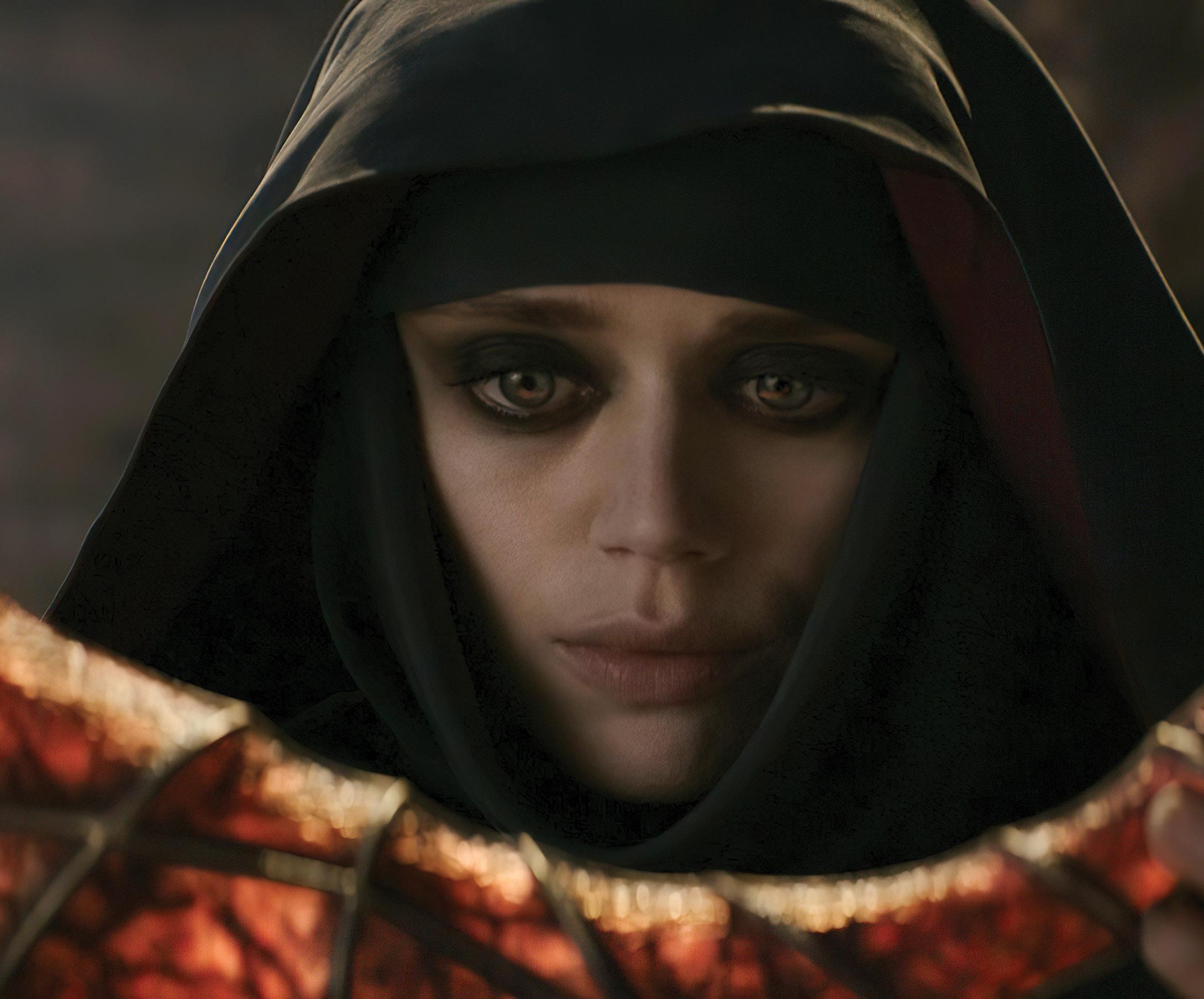
DAISY HEAD: Firstly, I didn’t have to shave my head. It’s probably one of the first questions that I asked myself before signing onto the project, just in case. We did have to cut about half of its length so it could fit underneath a cap. The whole process started out taking about three hours in makeup, but we did—no pun intended— shave the time, not the hair, to about two-and-a-bit hours. Honestly, the entire look is a credit to the [hair and makeup design team] who created a uniquely beautiful and powerful look for my character. They spent months designing and developing various
options for her. The finished product is pretty remarkable.
We also see you floating in the trailer. Did you get to do some wire work?
I actually learned to levitate. No, I did do some wire work, which is always super fun. They're so great at making you feel safe and secure in the harnesses. I think that the biggest challenge is making it work with the costumes. We did have a couple of instances where a sleeve got caught or just stuck to my head and face. But we worked around it. I was pretty high up for some of the work, and I got some beautiful views across Belfast. There’s an incredible, liberating freedom from
being suspended in the air. It was so fun to be able to move all of my limbs freely and really harness the majesty of the movements in creating the spells.
If you had to trust a character by giving them one job, who would you choose to know that it would actually get done?
I would have to choose Holga because she has an incredible ability to fully own who she is and fully exist in this space that she takes up in the world. She proves herself as a great ally, and she has a fierce and relentless sense of determination. So I feel like I would put my trust in her, and I feel she would do any job very well.

 BY RAY CHAN
BY RAY CHAN
This was a real fun set that I’d designed where our heroes had to first navigate through the silent army of gnomes in an area in the gnomish city of Dolblunde that is filled with terracotta-style statues, before climbing the steep Hill of Bones. The bones were made by our in-house prop-making team using conventional molding and casting techniques. All of the bones were cast in soft foam, making sure that if anyone fell, they would essentially land on a soft, bouncy surface. At the very top of the hill where Themberchaud sleeps, most of the bones (human and creature) were still recognizable, but towards the bottom one-third of the hill, we used crushed sea shells instead; the concept was to mimic bones that had been there for millennia, almost turning into dust. By the end of the first week of filming, we started to get complaints because of the smell; however, the actors thought this was very amusing. The side walls were all hand carved by our sculpting team, and my idea was to run the basalt rocks horizontally (as opposed to, say, the basalt rocks at Giant’s Causeway). The idea being that the horizontal tectonic plates in the Underdark were always in force with each other, forcing the weaker plates upwards in the valley.
This scene used a small part of the original set from Game of Thrones. Much of the King’s Landing set was destroyed for their last episode, but I’d found a little pocket where small staircases and a narrow, tight alleyway suited this execution scene. I took inspiration from the Medinas in Morocco, where you’d often see old timber beams spanning across the alleyways. Added to that, we made tattered reed shades acting as cover from the hot sun, giving the alley dynamic shadows on the tar-painted walls. Much of this fun scene highlighted Holga’s fighting skills and Edgin’s lack thereof.

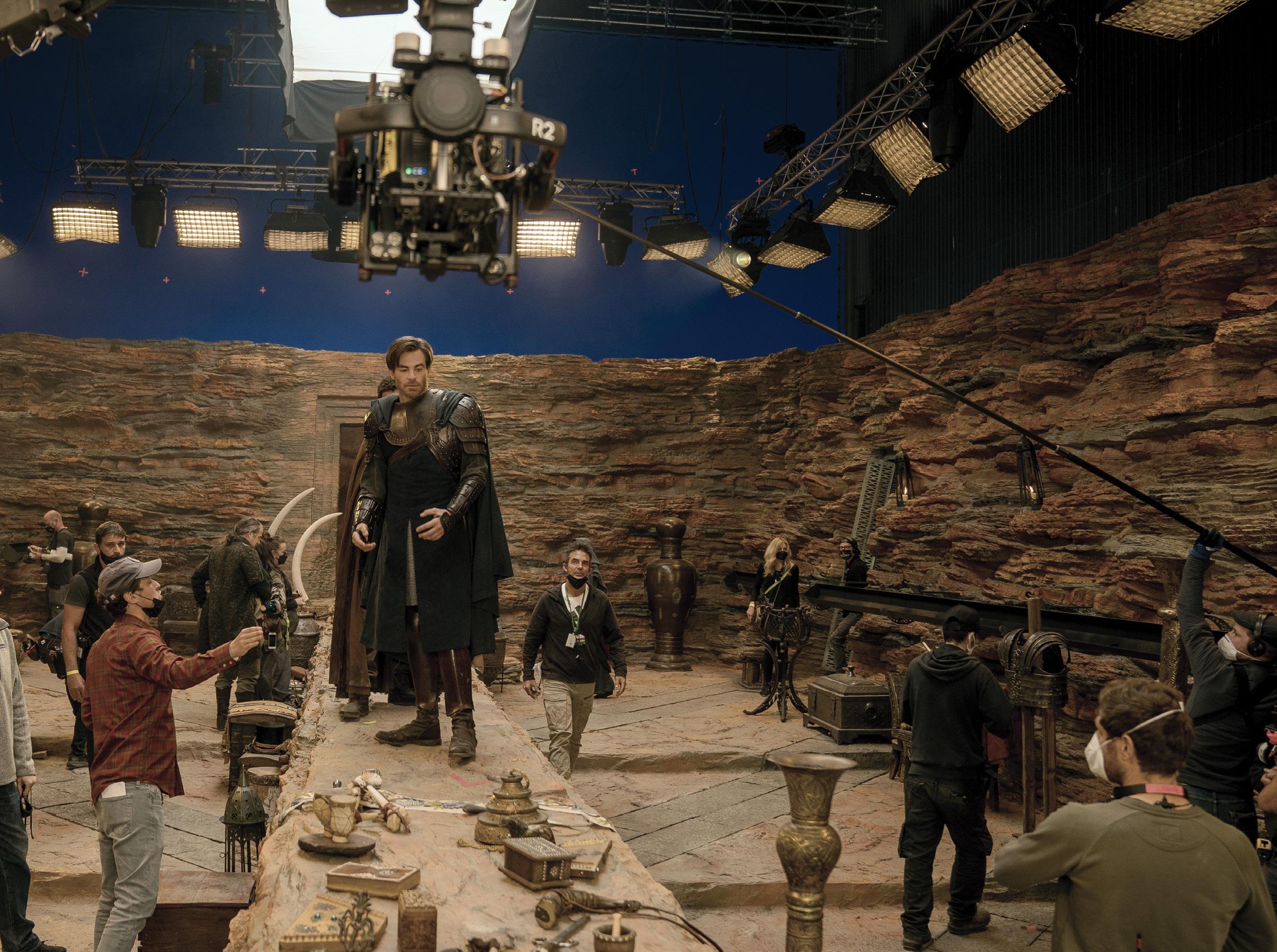
This was another fun set that was originally conceived to be excavated within a natural rock formation; many are found around the globe, often nicknamed “Sea Stacks.”
I designed this set whilst looking at rock color formations in Australia, whereby the strong reds and deep oranges (from iron) were the key signatures. The sequence tells the backstory of Edgin and the crew secretly entering Korrin’s Keep, stealing as much treasure as possible before getting caught. For this visual, I designed a long catwalk/runway that started at the main entranceway and ran almost to the other side of the room. This catwalk became not only a super long table for the treasures but also something that the stunt team could run at speed or hide under whilst under attack from above.
The alarm system was a really cool element too. If the alarm was ever triggered, a flame would ignite a pool of oil that was held in a metal tray. So two lines of flames would trace around the room in a split second. Our set decorating team and SFX team really enjoyed making this as a practical in-camera effect. The set walls were made to withstand high heat and flame, making it really safe to film in.
This is another scene in the movie where we see armies coming under attack from a black dragon. We found a location called Clandiboye estate where we were allowed to excavate and dig into the landscape, basically creating a large scar. This was then dressed with the darkest soil and peat mix. Vegetable-based dyes were used on the green grass to simulate a burnt and decimated appearance. Once we dressed large chunks of coal and charcoal, the entire trench would become the “after-effect” of the black dragon acid attack.


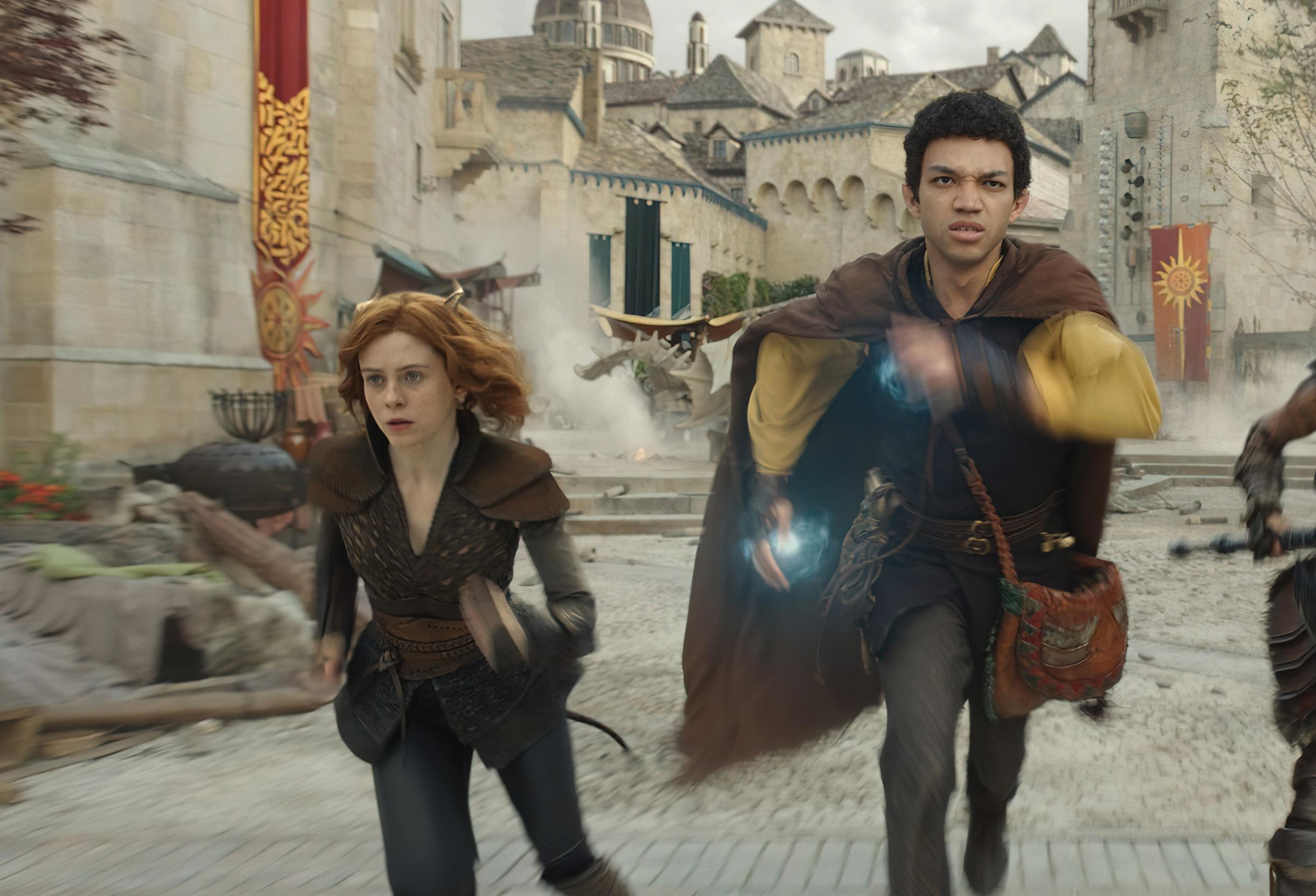
In this scene, Xenk meets his rival in Dralas and both duel amongst the silent army of gnomes. This was one of the first sets I designed, and I had this idea that deep within the bowels of the Underdark, an entire silent army of gnomes would either stand or kneel, all bearing gifts to Themberchaud.
Each gnome was built in four sections like a Greek column and stood at almost nine feet tall. I imagined that each gnome would carry a lotus leaf bowl, and within the bowl would be offerings of precious gems, food, and wine. However, Xenk had also hidden a magic relic in one of the bowls, and he was the only person that would know exactly which gnome, which bowl. For me, this idea played into the game and fun element; the relic was always there, hidden in plain sight, except it was only Xenk that knew.


This is where we find our heroes battling Sofina in the City of Neverwinter. I designed the plaza from many memories of working in Spain and the Mediterranean. Inspiration came from Alhambra, warm sandstone walls [and] beautiful luscious greenery that would provide shade in the heat. Delicate hand-painted tiles would adorn the tops of the columns, adding a splash of color now and again.
I had so much fun designing this plaza which also had a front façade to a huge amphitheater. The walls leading to the stadium were all handmade glazed tiles just like the Ishtar Gate in Turkey. I had this idea that we could introduce a fun element where dragons and beasts could be integrated into the tiles, almost like a modern-day poster advertising a sports event. Rivals do battle!
Instead of gravel, dirt, or stone pavers in the main plaza, I wanted to use soft round cobbles. My construction team made several “models” which they then molded to form several large molds. The clever part is pouring a concrete mix into small sections of the floor, and whilst it’s still soft, the team would press the molds into it, like a stamp. The entire set was made this way and looked incredible.
In the lore, Neverwinter was famed for its warm climate but, most of all, known for its talented gardeners. So I set about with my Greens team, making sure that every plant, every tree, even the large living wall conveyed that story. A further deep dive into the lore revealed Neverwinter artisans were highly skilled at making water clocks. My Set Decorating and Prop team made fully functioning water clock that would feature in the town square opposite the living wall.
DELICATE HANDPAINTED TILES WOULD ADORN THE TOPS OF THE COLUMNS, ADDING A SPLASH OF COLOR NOW AND AGAIN.
Concept art for the owlbear, the monstrous alter-ego of tiefling Druid Doric (played
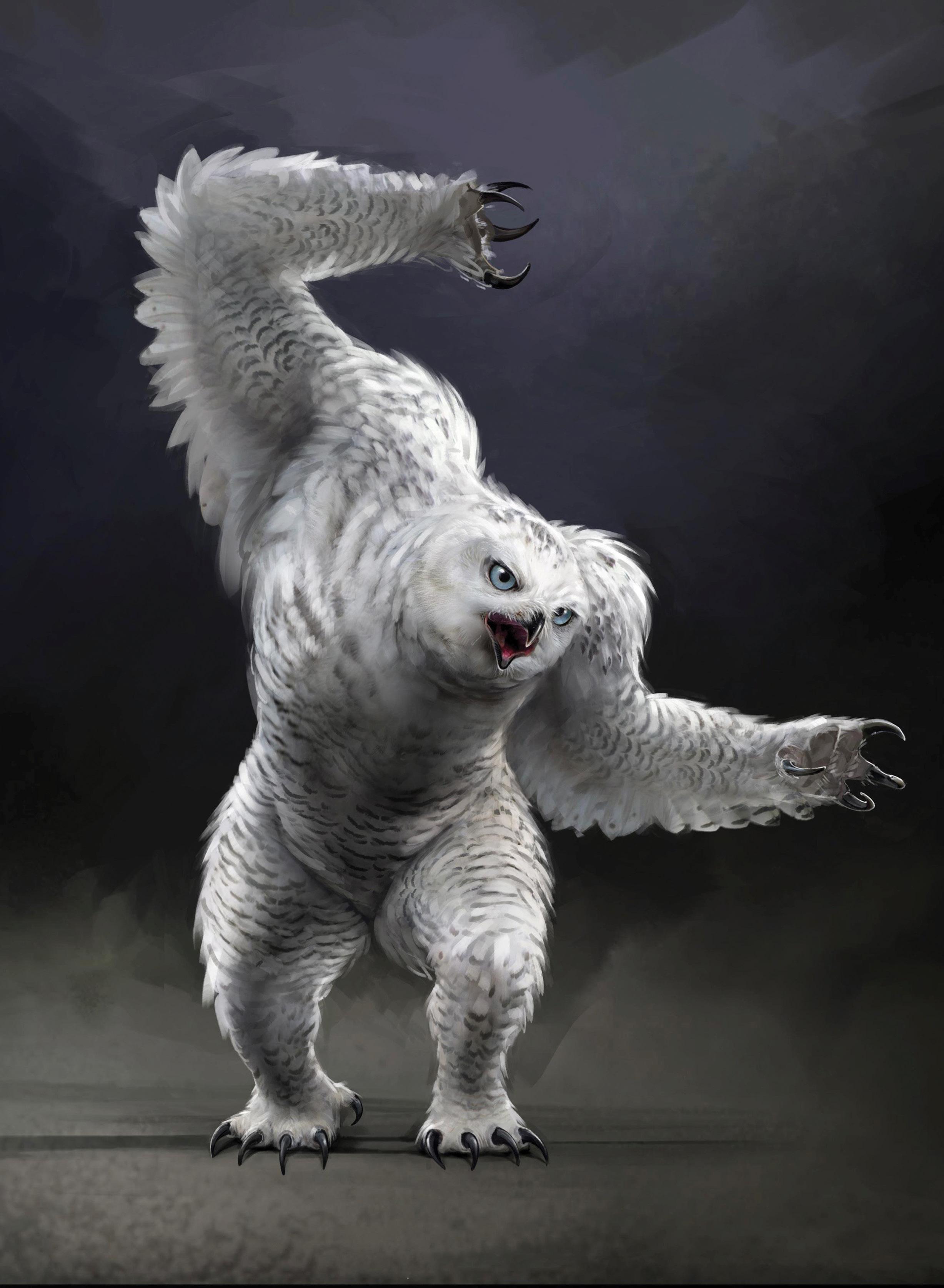 by Sophia Lillis).
by Sophia Lillis).
BRINGING THE WORLD OF DUNGEONS & DRAGONS from the tabletop to the big screen was no simple task, with hundreds of artists, animators, sculptors, and designers from different studios working in concert to make the film’s beasts, creatures, and curiosities look as ferocious and fantastical as they deserve to.
Den of Geek spoke with Shane Mahan and Lindsay MacGowan, co-owners of special effects studio Legacy Effects, and Todd Vaziri, compositing supervisor at ILM, who gave insight into the practical and digital effects that make Dungeons & Dragons: Honor Among Thieves’ monsters and magic look so distinctly D&D.
Tiefling druid Doric, played by Sophia Lillis, has the enviable ability to shapeshift into a snowy owlbear, a hulking monstrosity with razor-sharp talons and a head that turns on a swivel. The team at ILM obviously had no real-life reference to help them, but the animators concentrated on giving the beast personality and conveying that there’s a humanoid brain in control of all the chaos.
“Even though we were doing this creature that is twice the size of a horse picking soldiers up and flinging them around, we had to keep an eye on the lightness and the comedy of the situation, which was a super fun challenge for us,” Vaziri explains.
One moment in the film that strikes the balance of brutality and humor involves Doric’s owlbear mauling a group of soldiers. “She’s on all fours, and she does a very owl-like look at her next target,” Vaziri explains. “Almost nothing in her body moves except for her head. It’s this little roundabout turn, and it’s really funny. Right after that look, the owlbear goes in to attack.”

As a digital creation, the owlbear looks incredibly tactile and plausible, with movements that mimic real-life animals. But Vaziri and the team at ILM were mindful of keeping things fun and supporting the lighter tone the filmmakers were going for.
“The typical movie that we work on is treated with extreme seriousness and gravitas,” Vaziri says. “The wonderful thing about this movie is that it has a twinkle in its eye. It’s
funny, and the way we executed our visual effects had to support that. We don’t want to lose the charisma that the movie is trying to portray.”
The original D&D jump-scare, mimics, have been a common peril in the game since the original Monster Manual, more often than not assuming the form of a tantalizing treasure chest to lure less perceptive adventurers into their fangy maws. Naturally, they make an appearance in the movie, with Michelle Rodriguez’s barbarian, Holga, falling victim to the monster’s ruse.
While the mimic that we see in the film was mostly rendered digitally by the ILM team, the folks at Legacy Effects lent their expertise with special effects and props to make the scene feel more visceral than it would have been otherwise.
“The action that takes place in that scene is so quick and so frenetic that we ended up just making the physical tongue that shoots out of the box,” Mahan explains. So the tongue that attacks Michelle is there physically, and then there’s a digital mimic treasure chest with teeth that are attached to the tongue.”
Legacy Effects and ILM have worked together on numerous films for decades, honing the art of marrying CGI and practical effects in a way that’s imperceptible to
audiences. “We have a great relationship with the team at ILM,” Mahan says. “We’ve worked with them since way back when on Jurassic Park, so there’s a great camaraderie and collaboration that always happens with our teams.”
Because the filmmakers were so insistent on showing animatronics in-camera whenever possible, many of the creatures, like the mimic, were done as hybrid creations between the teams, which required a high level of coordination and planning. When Legacy builds the physical models and costumes, they take into consideration what enhancements they’ll need ILM to add later, from something as small as a flit of an eye to something as significant as a missing limb.
“If you have to have a blue screen sleeve on an arm that makes it look like it’s going to be gone, ILM has to do that,” Mahan explains. “Or maybe
we hollow out a character’s nose, so we paint the actor’s nose black, and ILM adds the final touches. We’re big believers in collaboration.”
One of the most gratifying things for both effects houses to see is when audiences can’t discern whether or not a creature is made practically or digitally, which ultimately allows the viewer to not think about the effects at

all and get lost in the story. “If we do our job well, nobody will be thinking about where one team’s work begins and the other’s ends.”
The gelatinous cube, one of the most classic, hilarious enemies from D&D

lore, makes an appearance in the film to wreak jiggly-wiggly havoc on the battlefield. Despite its seemingly simple makeup as a mindless mass that generally doesn’t move, the cubic creation posed a unique challenge for the team at ILM.

“Nobody’s ever seen anything quite like this before on film,” Vaziri explains. “We asked ourselves, well, what would it look like if humans were suspended inside a 15-foot by 15-foot cube made of gelatin? How would the gelatin react? How would the light refract through it? What happens to the heroes’ hair? How much could they move?”
The artists and engineers did extensive studying and experimenting, running simulations, and testing physics and lighting to get the look of the cube just right. They arrived at a point in their rendering where the cube looked incredibly realistic and
accurate to how gelatin looks and behaves… but there was still something off about it.
“We were like, okay, it looks real,” Vaziri recalls. “But it’s not going to work for our movie.”
In the scene in question, the heroes dive into a gelatinous cube to avoid a pouncing, cat-like displacer beast. The actors are frozen in place with their faces stuck in hilarious expressions. But with the real-worldaccurate cube properties and physics in place, the camera wouldn’t be able to register the actor’s faces at all.
“We wanted to make sure those facial expressions came through,” Vaziri says. “So if the camera was outside the gelatinous cube, if the camera was inside the gelatinous cube, how do we make sure those expressions still read? That was an interesting challenge. We were tweaking and making up our own
logic—like, wait a second, the camera can go through the cube, but the characters can’t move. We made it work. These were really fun problems to solve.”
If you’ve seen the trailers for the film, you probably noticed a certain red, rotund dragon lumbering after the heroes on a mound of skeletons. While the filmmakers haven’t confirmed whether or not the red dragon is a specific dragon from D&D lore, the big guy looks to be a centerpiece in the movie’s menagerie of screen creations.
“There’s a scary-comedic feel to what the red dragon is,” Mahan says. “He’s too heavy to walk on those legs, so he kind of slides on his stomach, and his wings aren’t quite big enough to make him fly.”
While the red dragon is largely a digital creation because of its size and movement, Legacy did assist ILM in making the creature look as embedded in the environment as the rest of the more practically constructed monsters. “We made a skin section of the red dragon for lighting reference to use on set so that they had something physically there to match to,” MacGowan explains. Mahan adds that the section of reference dragon skin “was four feet by four feet with a translucent resin painted to the scales. Each one was the size of a dinner plate.”
The fear with CG characters like the red dragon is that they look detached from the environment in a way that’s distracting to the viewer. But Vaziri believes that embedding digital characters in the movie’s world goes beyond issues of fidelity and lighting. For him and his team, it’s more about matching the look of the movie on a deeper cinematic level.
“Yes, the aspects of reflection, refraction, diffuse, textures, paint, detail, movement… all of those
things are incredibly valuable,” he explains. “But the visual effects need to fit the style of the movie. If you're watching a shot, a reverse shot of a bunch of actors talking, and then a creature comes out, and then all of a sudden, they’re using different lenses, everything’s in silhouette when nothing before this was in silhouette. The cuts are really short… it seems like they’re trying to hide something. For this movie, our visual effects had to match the camerawork for it to look and feel real.”
One of the standout comedic scenes in the movie involves the heroes meeting reanimated corpses who explain how they died. The heroes are allowed five questions before the corpses die again (forever this time), and to the party’s dismay, Edgin the bard (Chris Pine) exhibits a tendency to ask dumb ones (“Four more questions, right?”). Legacy Effects handled the creation of the corpses, a job the studio was more than happy to tackle.

“When we first read the scene, conceptually, it was just so much fun,” Mahan says. “We don’t often get to do scenes that are comedic.”
The team wanted to match the lighter tone of the material, so they avoided the standard gruesome details you’d typically see with undead characters and zombies, instead opting for more stylized, expressive designs. “Our approach was to make them very interesting characters, but not entirely frightening or realistic because they’re seen as comedic.” MacGowan added that the producers and directors were “keen on it being sort of like the feeling of the Haunted Mansion from Disney; they’re fun to look at. They have a great deal of personality to them.”
Each corpse suffered a different death and has a unique story to tell, so their costuming and makeup had
to reflect that and act as a means of storytelling in itself. Actors were fitted with full-body makeup and corpse costumes, with additional animatronic and digital pieces added on for effect. Every inch of the corpses was meticulously designed to a level most viewers probably won’t expect.
“Each of the corpses’ deaths had to correspond to how they talk about the past, so that had to be implemented into their look, whether they were burned alive by a dragon or cut by an axe. There was extensive interface with the Irish and English costume departments because there are flashback moments where the corpses are alive. So whatever costumes they were wearing when they were alive, we had to recreate 100-year-old, 500-year-old, decomposed versions of those costumes. It was very difficult
and time-consuming, but it was satisfying and a lot of fun.”
The team at Legacy Effects has worked on some of the most spectacular puppets and animatronics put to screen, from Iron Man’s suit to the bear in The Revenant, to Grogu on The Mandalorian. But with Dungeons & Dragons: Honor Among Thieves, the studio pushed themselves to experiment with something that they’d never tried.
Chancellor Jarnathan, played by Clayton Grover, is an aarakocra — a bird-like humanoid with a giant wingspan and a particularly menacing, beaked visage. While there are a few shots of Jarnathan in flight that are done digitally, most of
his scenes were done in-camera, with practical effects. Legacy Effects built a massive animatronic costume to bring him to life, requiring multiple puppeteers to operate. It’s unlike anything the team has made before.
“It’s a constant animatronic costume,” Mahan explains. “It’s a very complicated piece of costuming, and it’s a big leap forward in what we’ve been experimenting with on other shows. It has activated 13-foot wingspan wings that actually work
on Clayton’s body, and then an animatronic talking head and extension feet. He’s [about] nine feet tall… absolutely huge.”
The benefit of having Jarnathan and many of the other characters in the movie represented physically, with practical effects, is two-fold. For interior, close-up shots, seeing a real, tangible creature moving in-camera makes the character far more convincing to the audience’s eye than a fully synthesized image.

Additionally, having a physical model on set gives the actors something tangible to react to, which pays dividends in their performances.
“I think, especially when you have comedic moments in these types of films, having a physical piece there, having the actor and the puppeteers there, they can ad-lib,” MacGowan says. “You get something that you just wouldn't get if there wasn’t a physical piece there. So I think, in this case, it really helped bring out a lot of comedy in the film.”
One of the key elements of any D&D game is magic, so ILM essentially had no choice but to nail the magic effects for fear of enraging legions of fans. The team’s approach to magic in the film was to make the spells look more organic and textured than your typical fantasy CGI fairy dust light show.

“The aesthetic of the movie is extremely grounded,” Vaziri says. “Grounded and plausible and real and touchable. How do you do that with magical spells?”
Directors John Francis Daley and Jonathan Goldstein shot the film in a way that feels gritty and physical, using as many practical effects, sets, and locations as possible. The film’s heroes trudge through the elements and get their hands dirty, so the artists at ILM made an effort to reflect that tactility and realism in their magic effects, lending the action a deeper sense of danger.
“Every single time we had something physical generated from a character’s hands, we thought, what is the physical metaphor here?” Vaziri recalls. “If they’re generating a fireball, we need to make it feel like there was a fireball on set. If another spell is, say, affecting water to generate a giant wave, well, when somebody’s moving their hands around, what comes off of them? How about super-fine mist? Maybe you’ll see droplets… maybe you’ll see that it’s emanating from their hands. We wanted to make it feel like the actors had something in front of them. That’s where we want to be.”
Brad Martin, one of the main forces behind the action of Dungeons & Dragons: Honor Among Thieves, opens up about creating the combat for the movie’s party of adventurers. †
BY GENE CHINGIF YOU’VE EVER PLAYED DUNGEONS & DRAGONS, you know it’s all about the melee combat. Dungeons & Dragons: Honor Among Thieves rolled a 20 by enlisting veteran stuntman Brad Martin to oversee the stunts and fights. Martin has worked on some of the biggest action franchises in cinema, including The Expendables, Underworld, xXx, The Matrix, and more. He was George Clooney’s stunt double for Batman & Robin, along with five other films. A comrade-in-arms with noted stuntmen-turned-directors Chad Stahelski (John Wick) and David Leitch (Deadpool 2), Martin is forging his own path as one of Hollywood’s top creators of action.
Den of Geek: You’ve been in the movie stunts business for over 30 years. What new challenges did Dungeons & Dragons: Honor Among Thieves bring for you?

Brad Martin: I’ve done a few films with a lot of CGI and working with computer-generated creatures. But working on Dungeons & Dragons, we had two really challenging sequences involving two big CG creatures. It was great just to get my action skills dialed in with the visual effects crew and just getting a little bit more of an understanding of exactly how to piece these sequences together. There were different techniques that we tried and used research and design just to figure out what worked and what didn’t work in terms of how to interact with the creature that was not actually there.
And John [Francis Daley] and Jonathan [Goldstein] were
amazing directors in terms of they knew exactly what they wanted. Obviously, there’s a little bit of room for interpretation, but [they gave] me direction in terms of knowing what the shots are.
Beyond the CGI monsters, the hand-to-hand fights look great. That trailer scene where Michelle Rodriguez’s Holga snaps the bow on her attackers is hilarious. That’s one of my favorite fights in the film. I had the guys put in a little inspiration from one of my favorite action stars, Jackie Chan—a little bit of that feeling in there. I mean, Michelle Rodriguez, her character is obviously very strong.
Yeah, as I was stepping up and dealing with more of the action, I brought in an action choreography team and a stunt coordinating team below me. My buddy Dian Hristov

and his team came in. This was a long process. It went over the course of eight to ten weeks. We took as much time as we could to choreograph these fights.
What was it like working with Michelle Rodriguez?
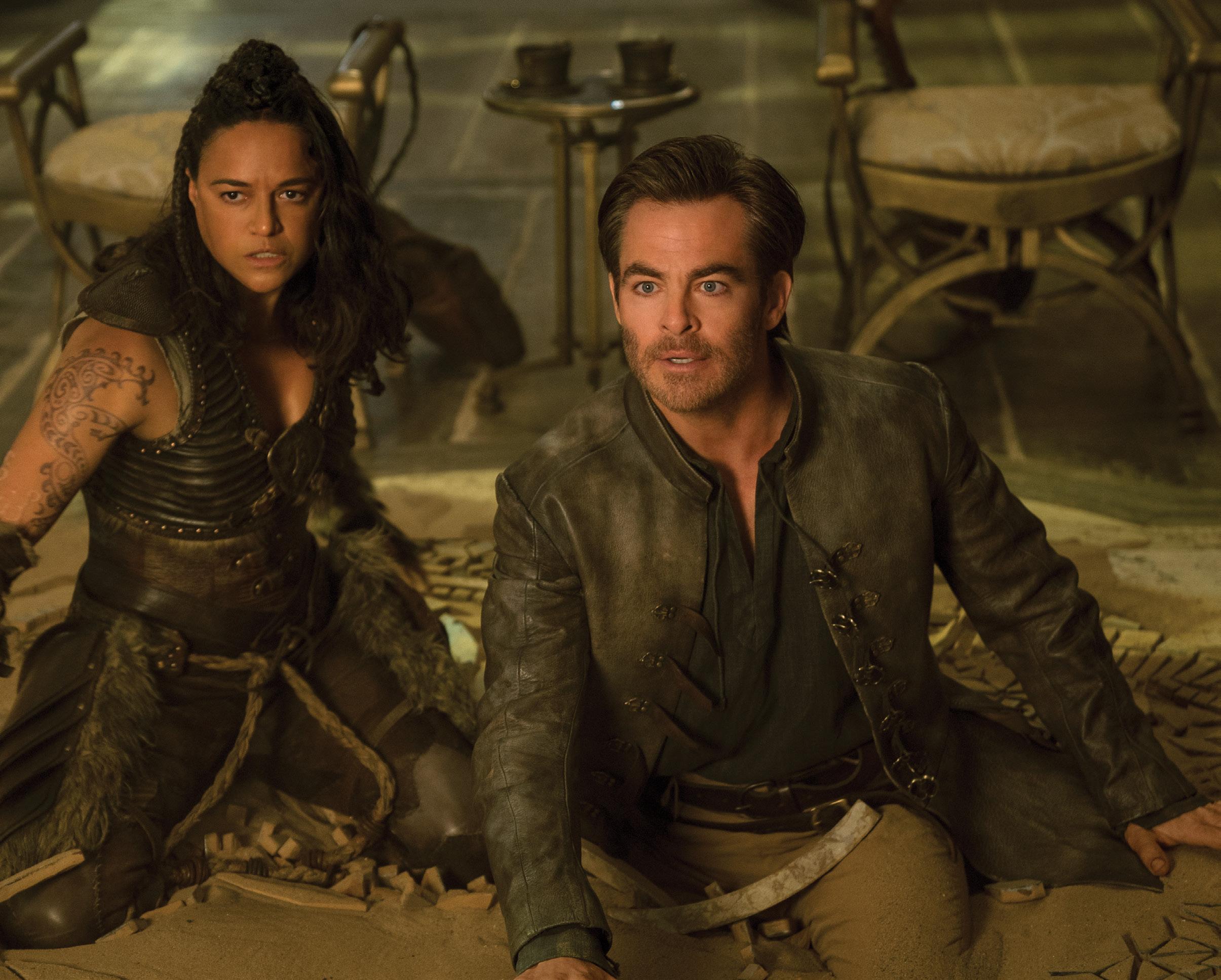
Michelle brought high energy. She brought her character to life. She created Holga. She brought out the essence of what John and Jonathan really wanted to see from that character. I think she did an amazing job.
She’s obviously an action star. She would come in on the weekends right before we did the fights, and we showed her what she needed to do. And she was able to pick things up faster because this is kind of her wheelhouse of action.

What about Chris Pine?
Chris didn’t have too much action because he’s more bringing the humor, and he’s the playmaker.
But Chris is one of the most talented professionals and actors I’ve worked with. I watch all of the actors, and I watch how they all go through their process and approach their scenes and understand what they’re trying to accomplish on film and then know how to bring that to the camera. He is the consummate professional. He’s amazing. I love watching people that are great at their jobs, and he is great at his job.
Everybody was great. As far as fights, Regé-Jean Page does a sword fight with Jason Wong. We had Regé for six weeks, and he trained his butt off every day. We hardly doubled him. Regé is a great talent as well. Every
cast member did stunts. As far as how many of their stunts, it depends on the amount of action they had.
Did you ever play D&D?
Once or twice, but when I was a kid, I had all the books. I used to use those books as inspiration. I know all the role-playing characters, and used those as my art templates.
Did you reference any earlier D&D projects from other media?
I even got back there watching the cartoon. We did this one where they’re running through this maze that keeps changing patterns. And one of the team’s references was from the cartoon.
Do you think you can score another Taurus Award for this?
[The Red Bull Taurus Awards honors stunt work. Martin won Best Stunt Coordinator for Live Free or Die Hard in 2007].
[Laughs] I don’t know. I mean, shoot, I have no ego at this. I couldn’t care less about that stuff. I don’t even think about it. Honestly, they send all of that stuff out to all your peers,
and usually, the one that the most people worked on gets the most votes for that show.
Action directors are getting more spotlight now, and rightfully so. Stunt people are some of the hardest workers, literally life-andlimbing for our entertainment. Your old stunt comrades Chad Stahelski and David Leitch have stepped into the director’s chair. Is that something that you aspire to do, too?
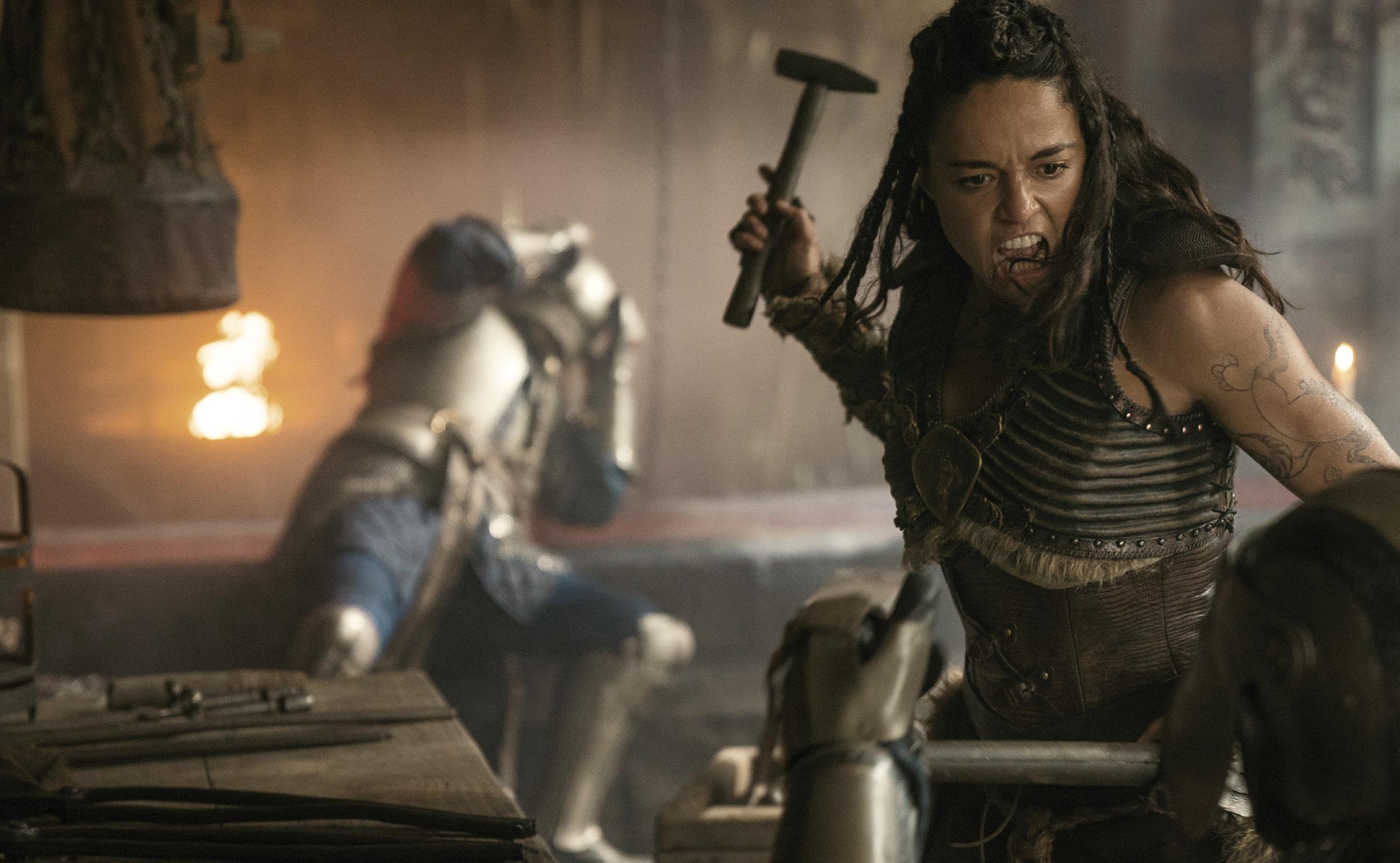
Chad was the best man at my first wedding. And Dave was at my
wedding as well. We grew up in the business together. Chad and I were best friends and all that. They just went about it in their own way. We all have different ways to go about it.
I believe that we have the most well-versed knowledge of filmmaking out of any group of people because we have to deal with every department and understand what each one has to deal with, for the most part. If you’re getting notoriety for it, it doesn’t bother me.
I’m all about being like a fall guy back in the day, the unknown stuntman. I just like to do my job; my work speaks for itself, and I move on to the next job. I don’t have any ego attached to it. I’m happy where I’m at right now.
But there’s definitely a need for action directors. I don’t feel like stepping up and having to deal with the actors and stuff. I like to stay with the action. While all my friends are stepping up, that just leaves fewer people above me in terms of the people I have to compete with in the action-crafting world. And I like that job. I like what I do, so yeah, I love my world right now.
I’M ALL ABOUT BEING LIKE A FALL GUY BACK IN THE DAY, THE UNKNOWN STUNTMAN. I JUST LIKE TO DO MY JOB; MY WORK SPEAKS FOR ITSELF.
